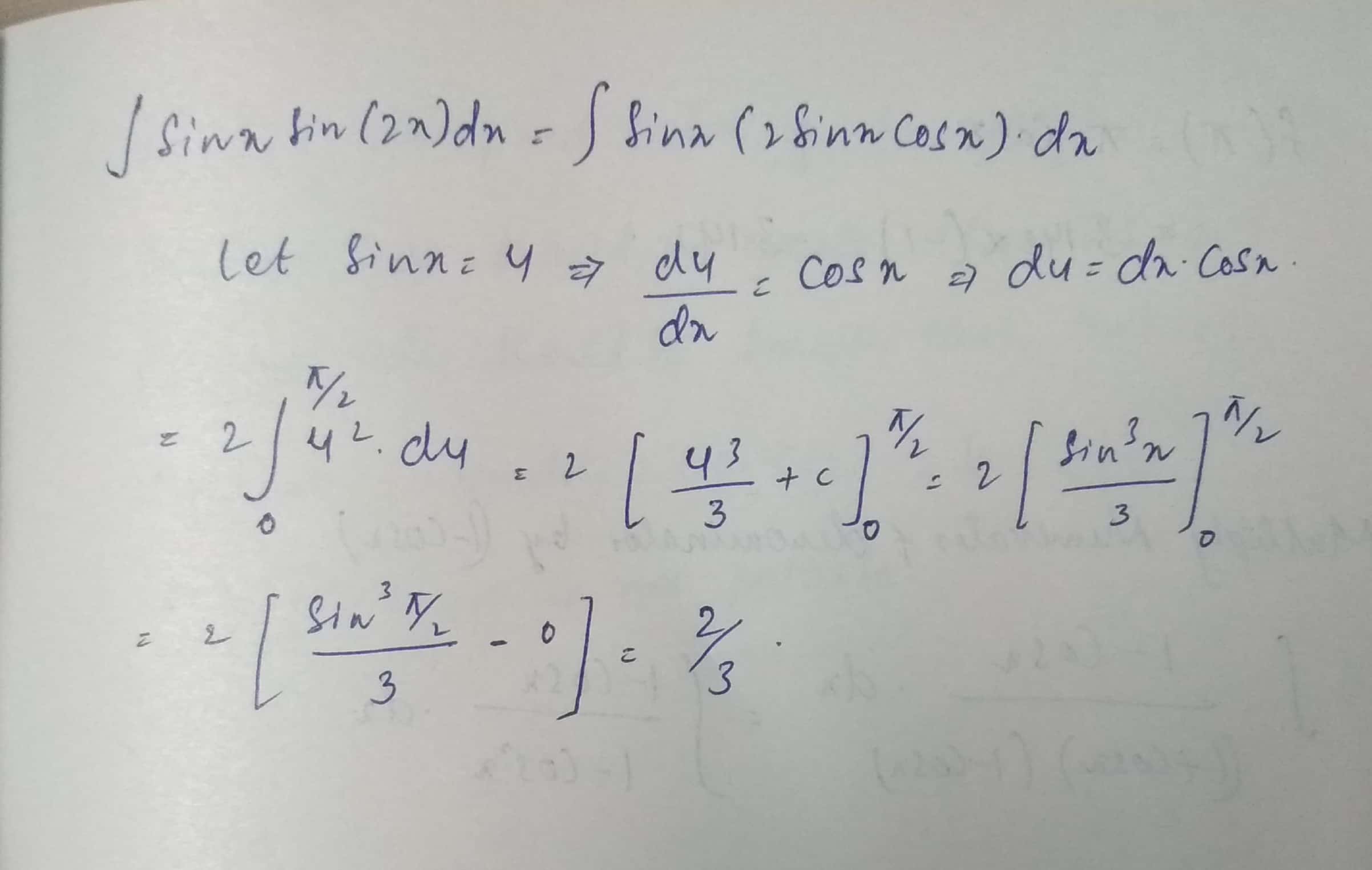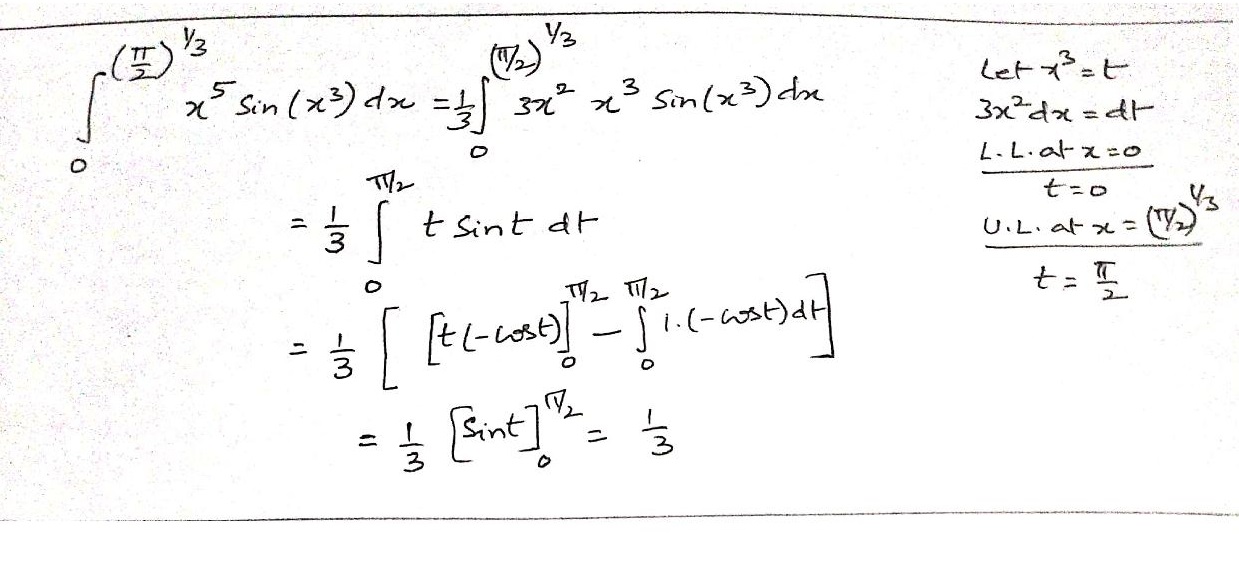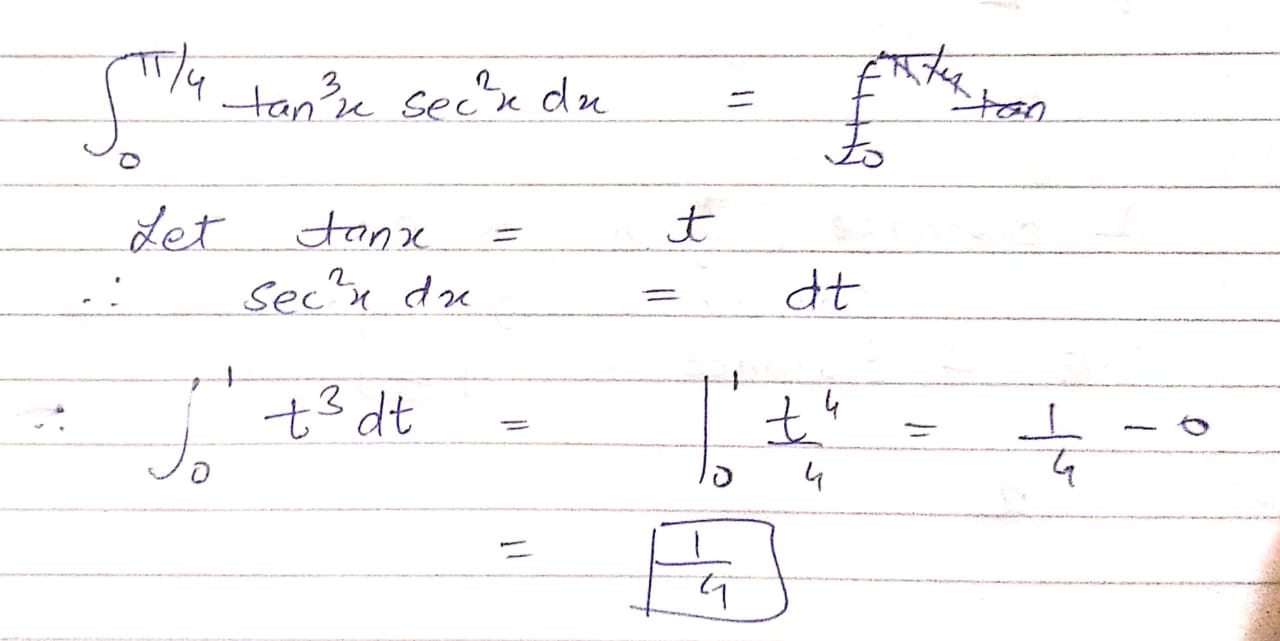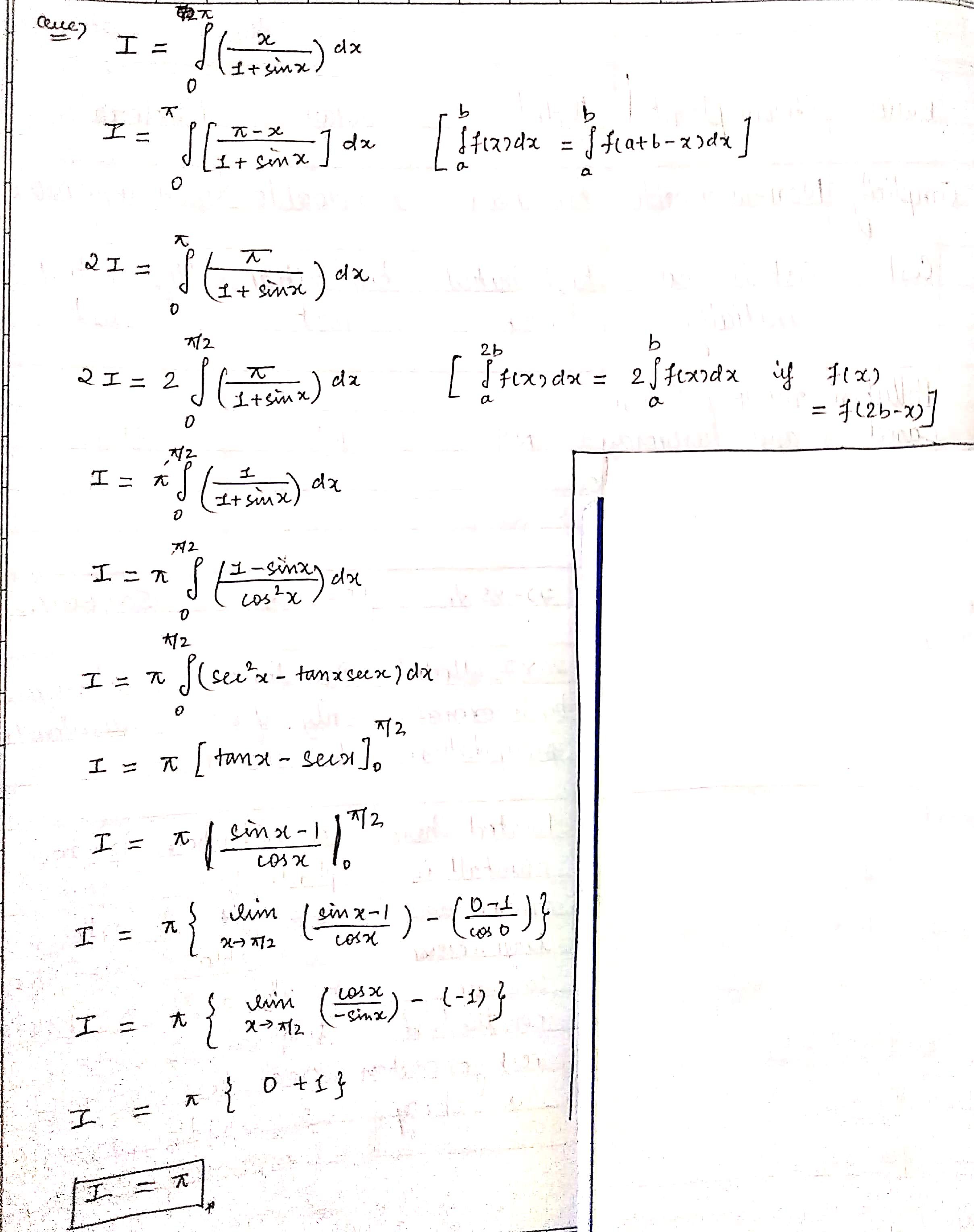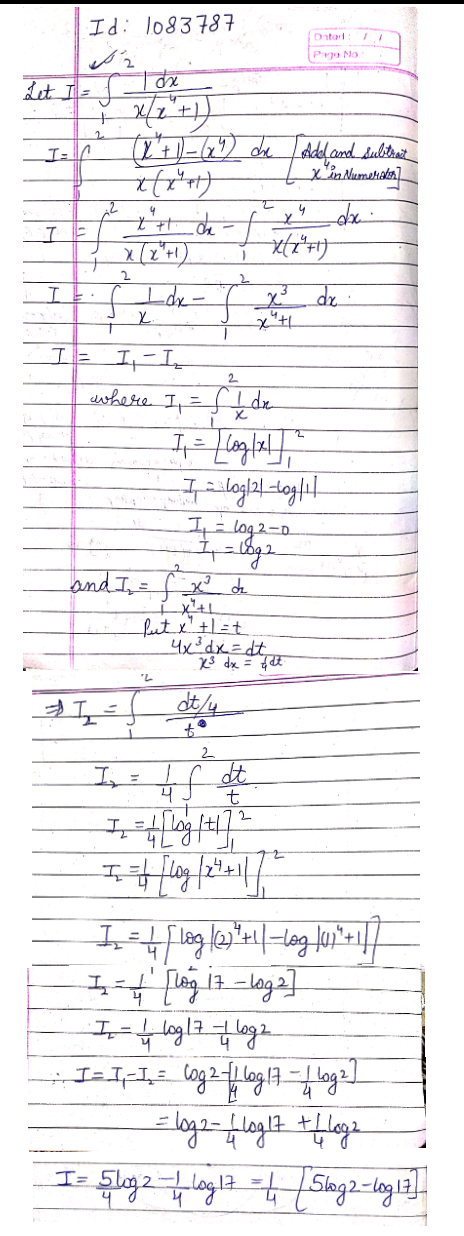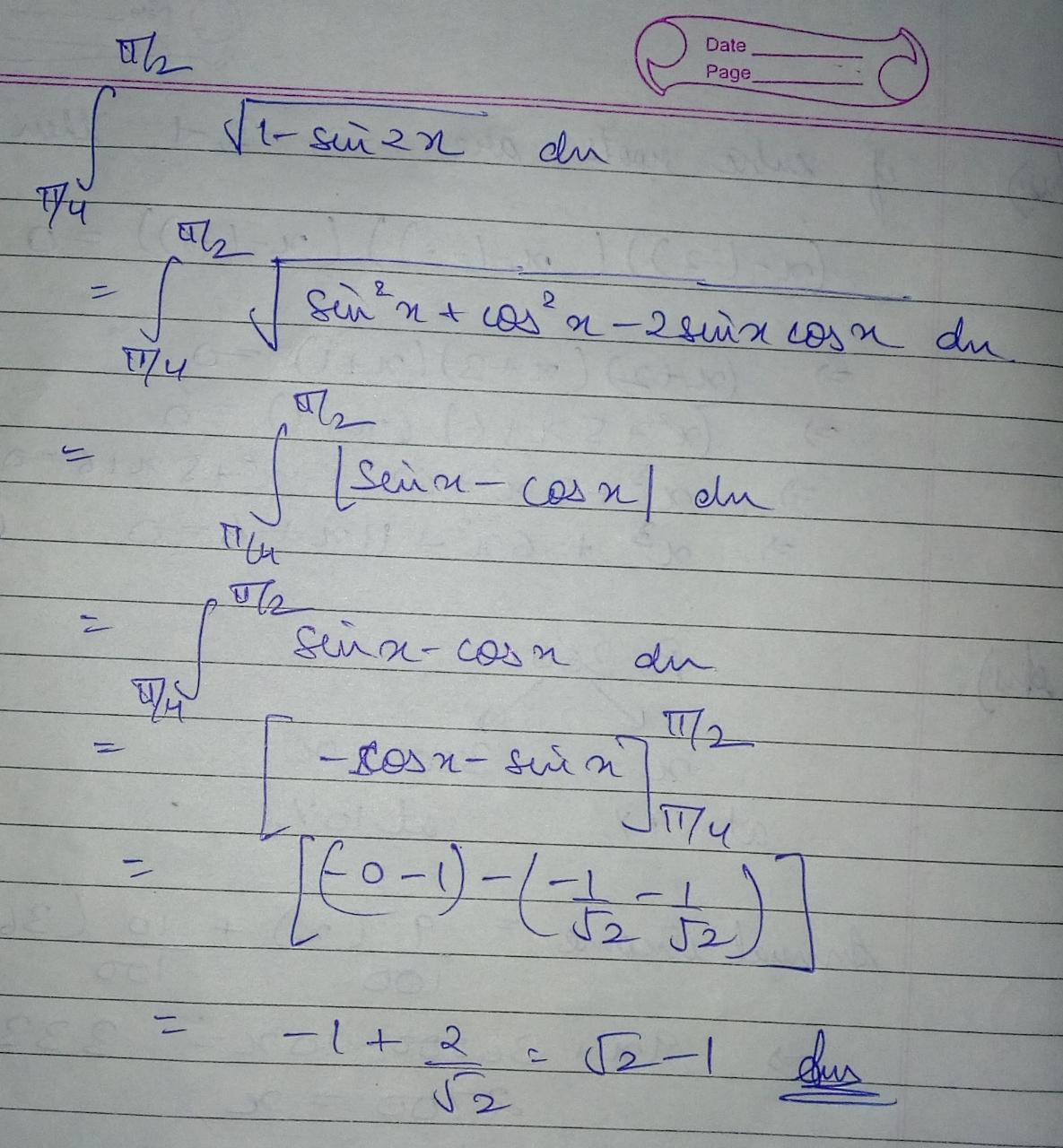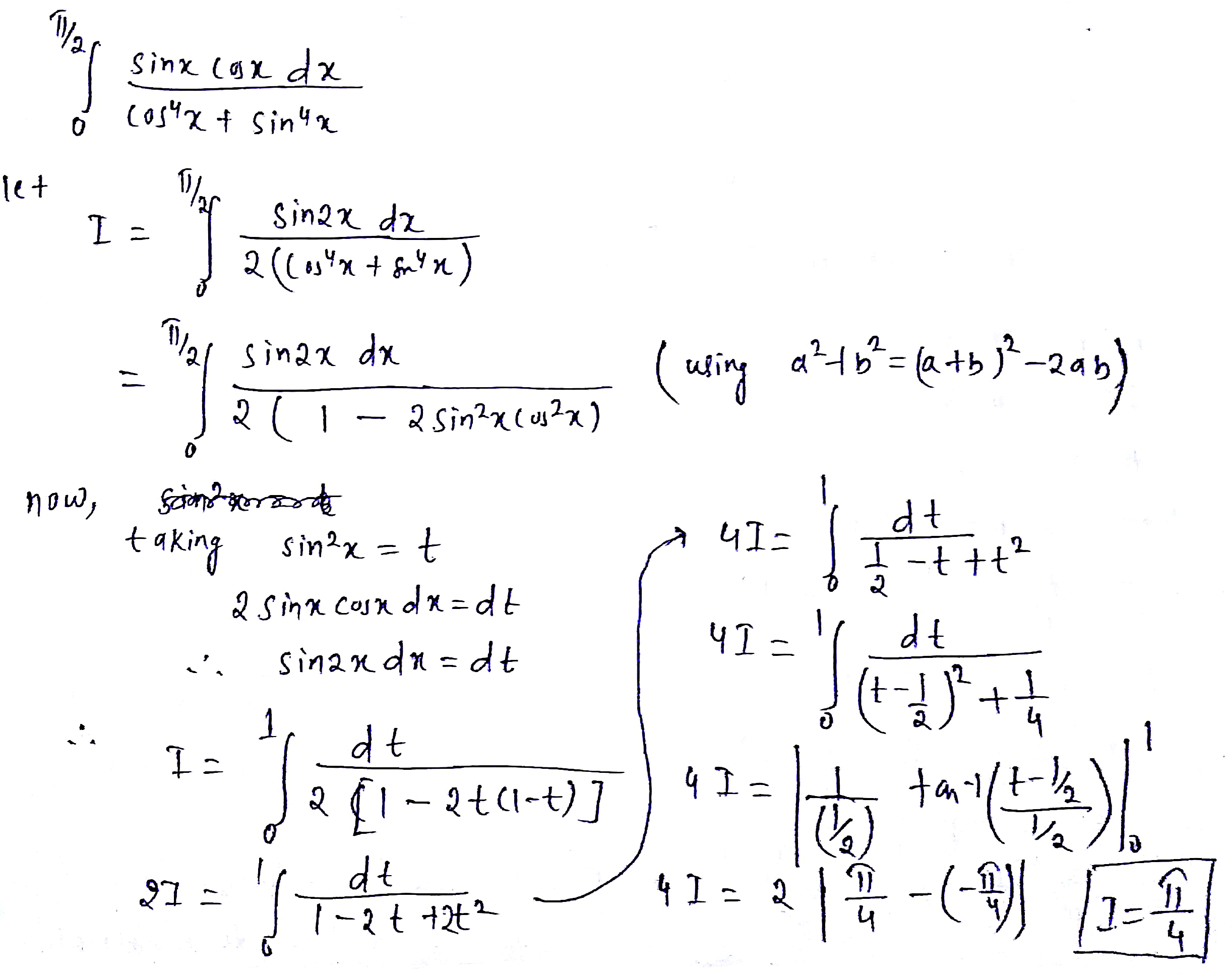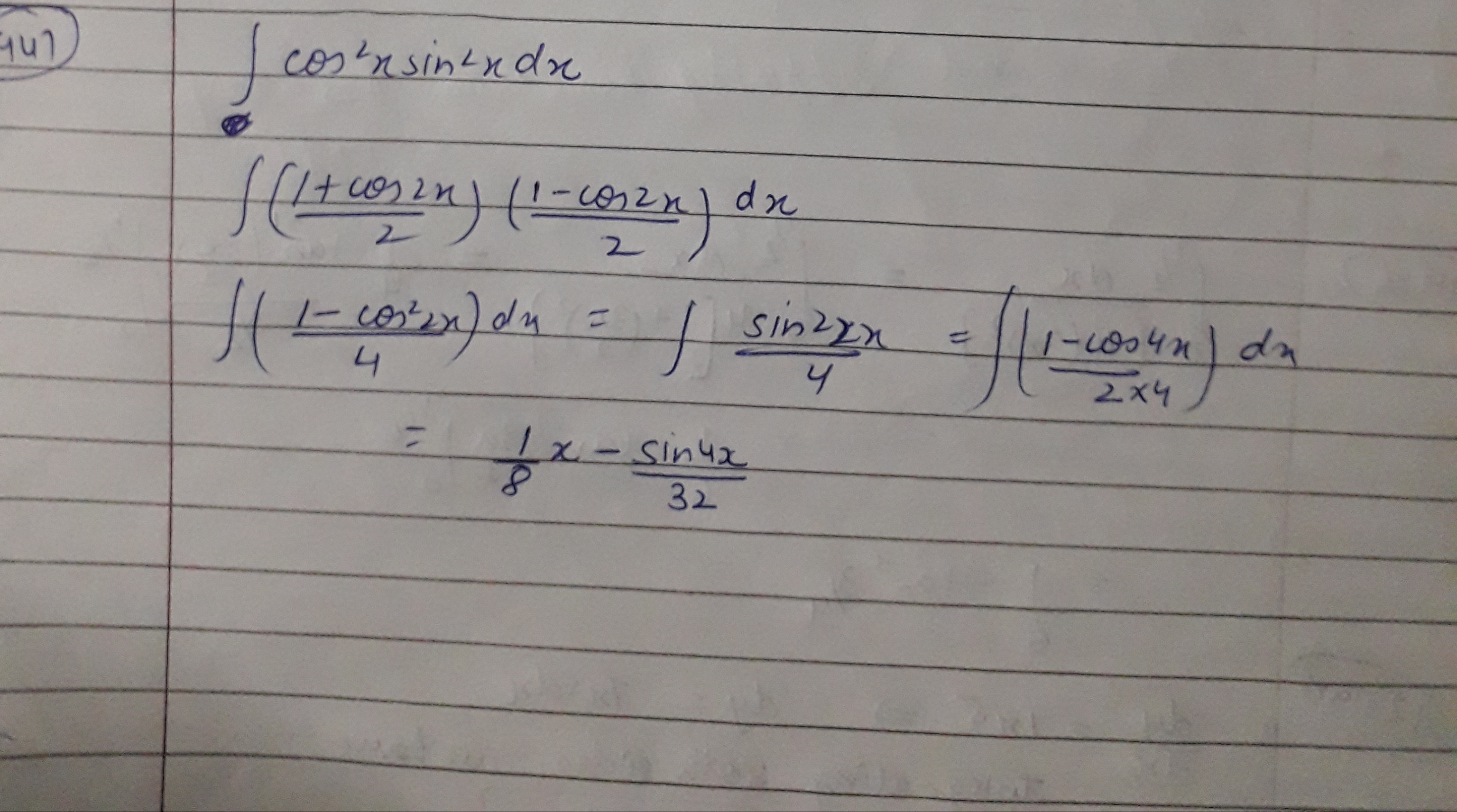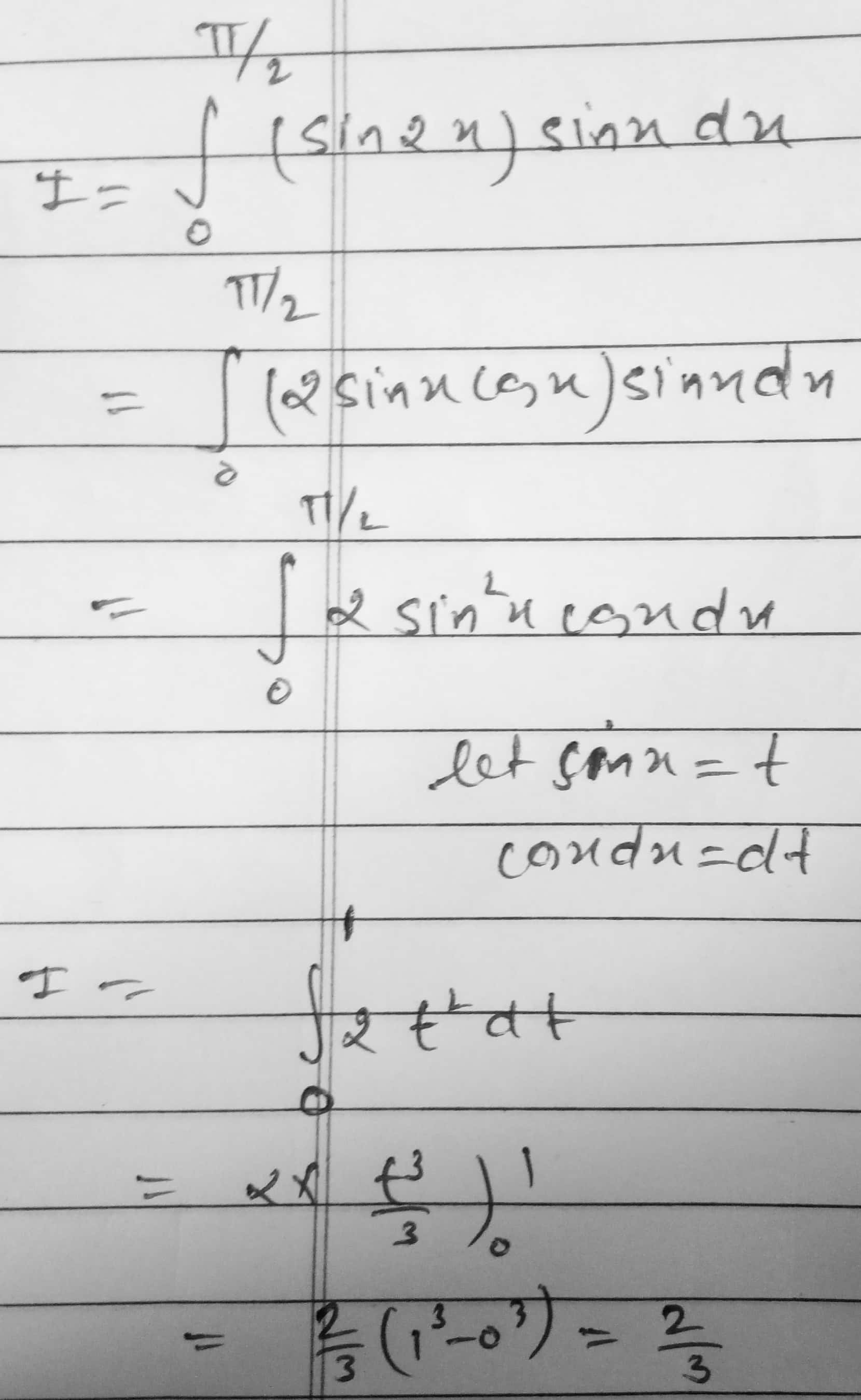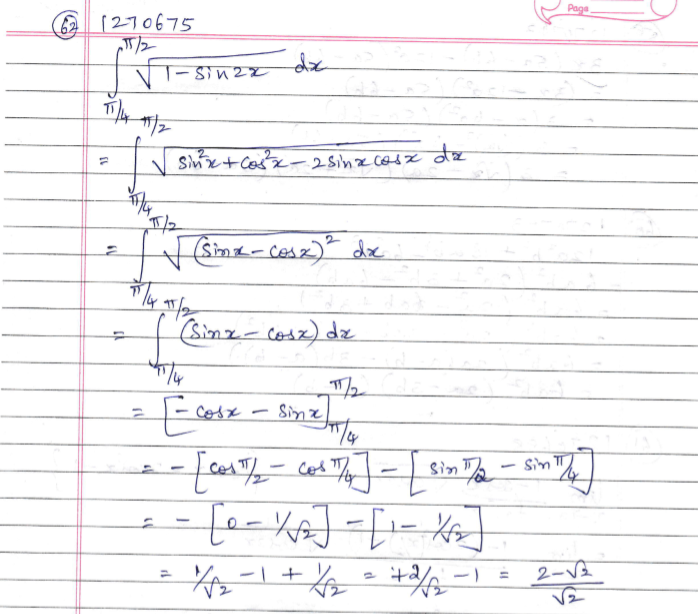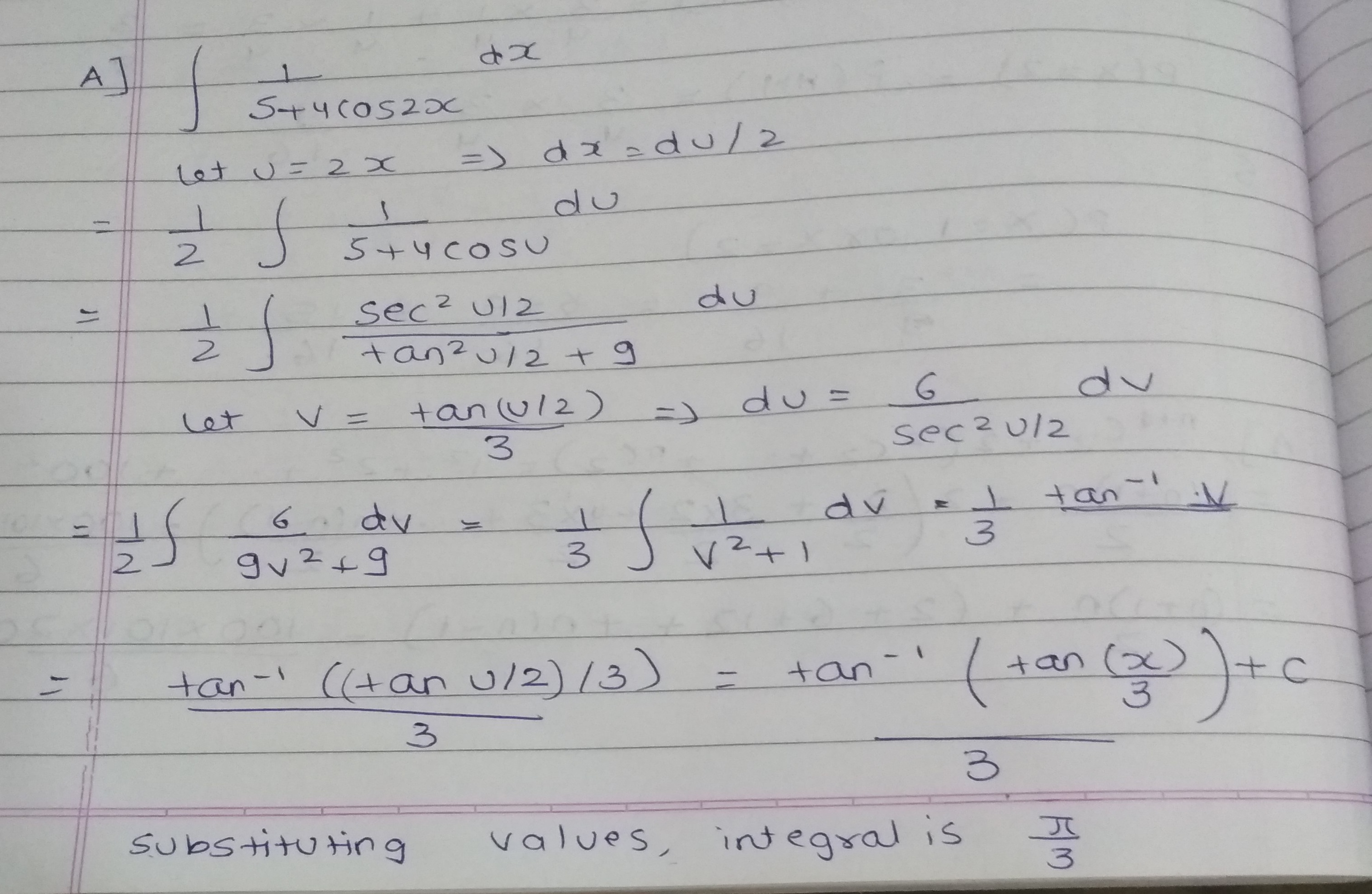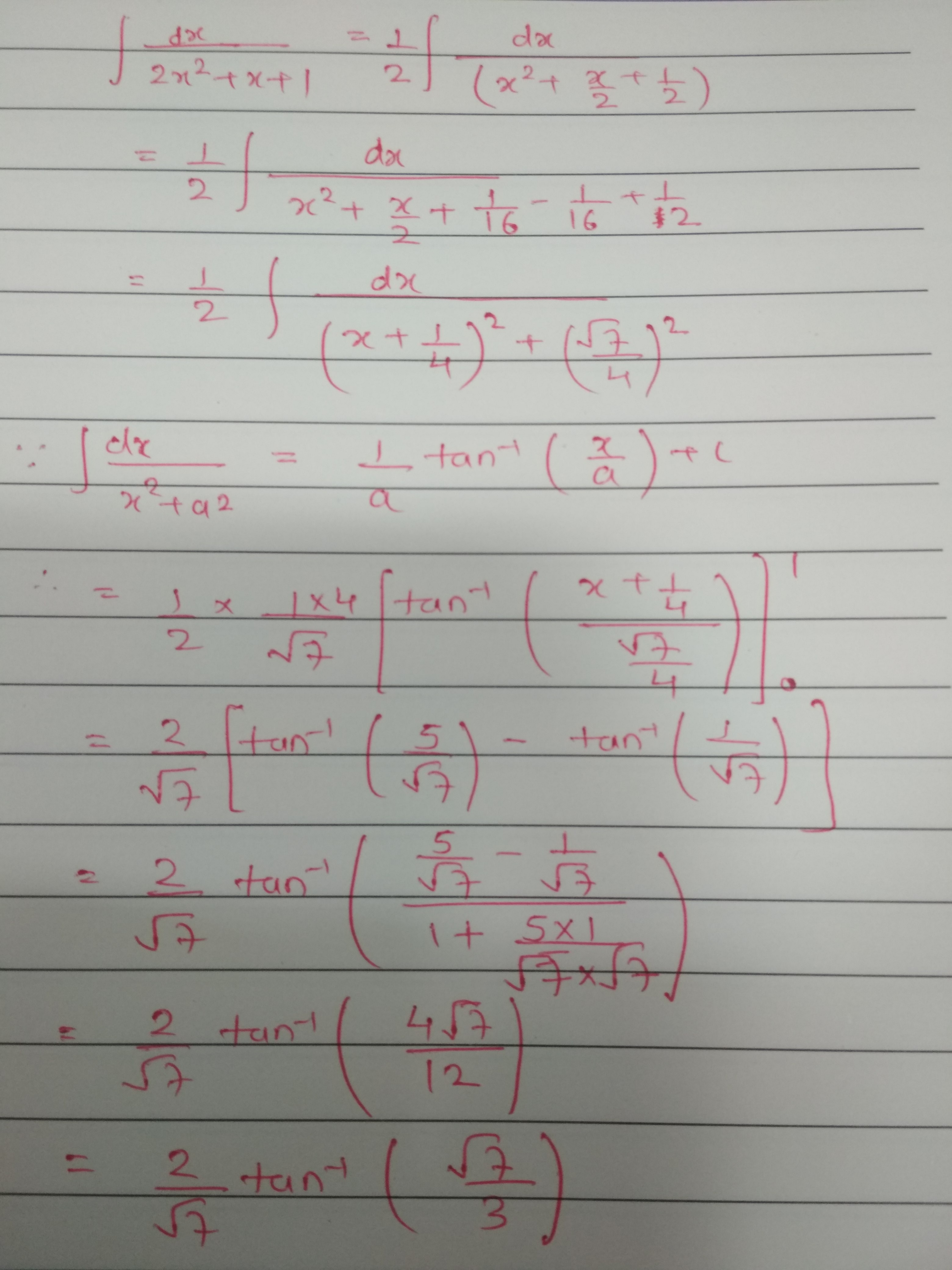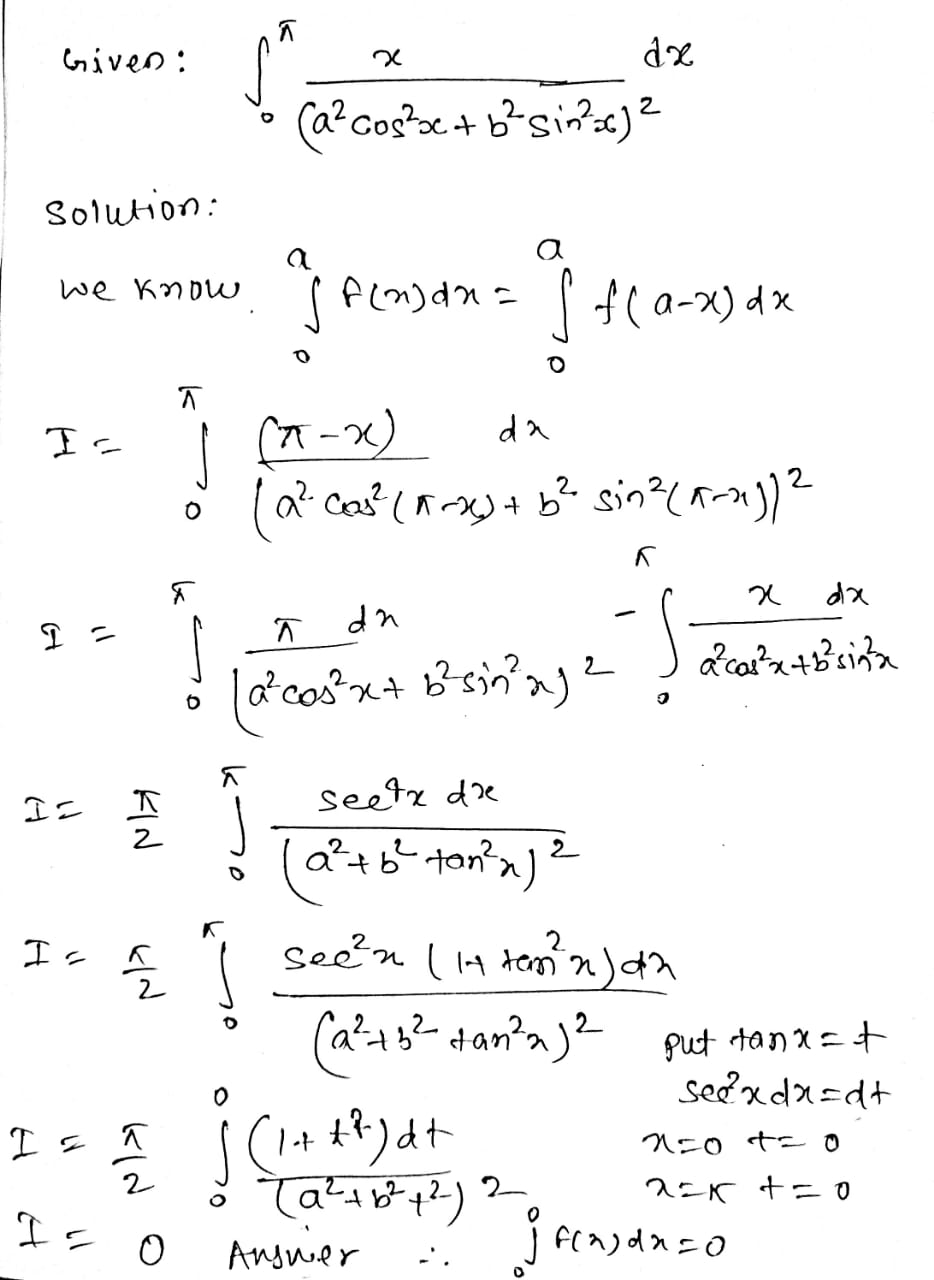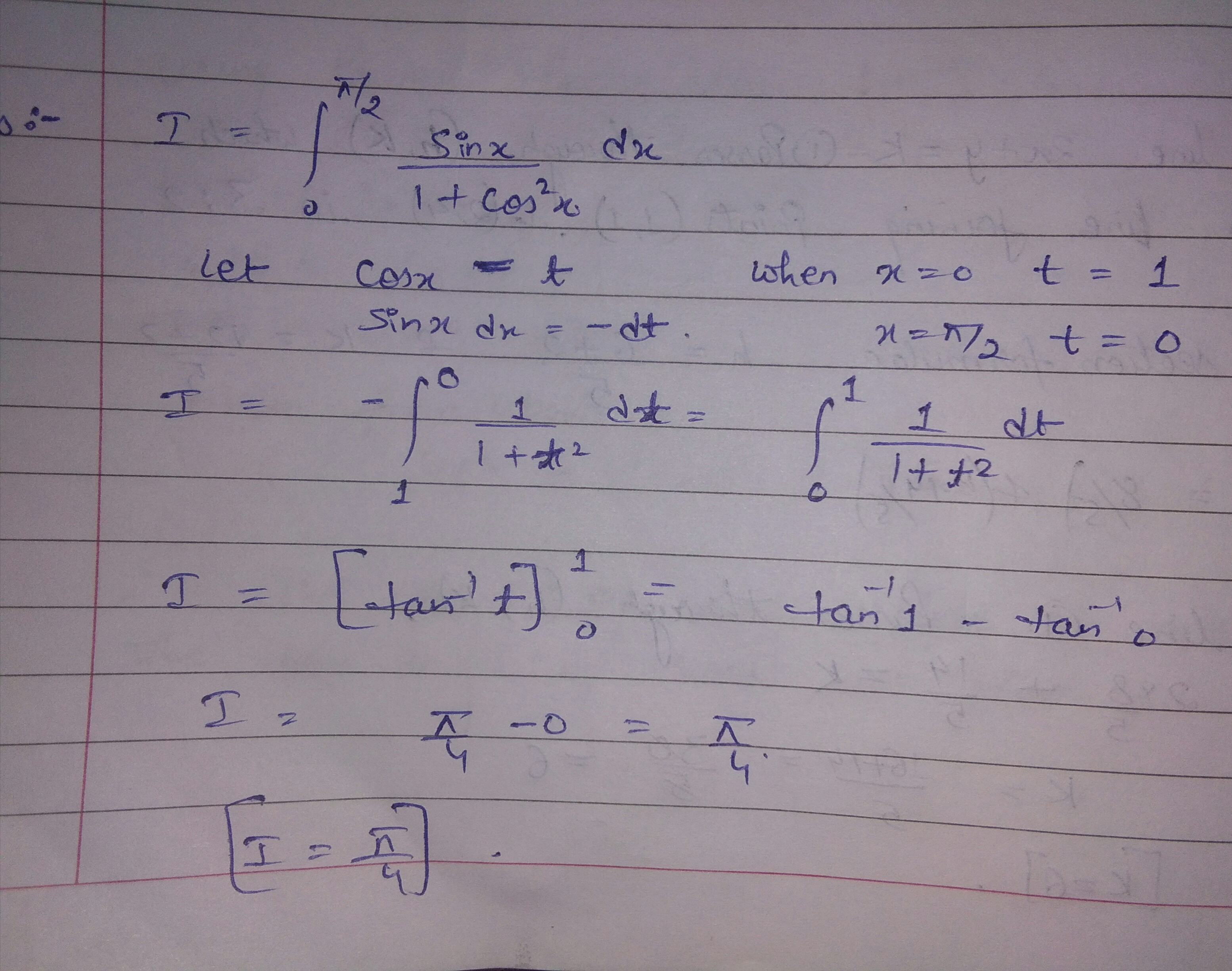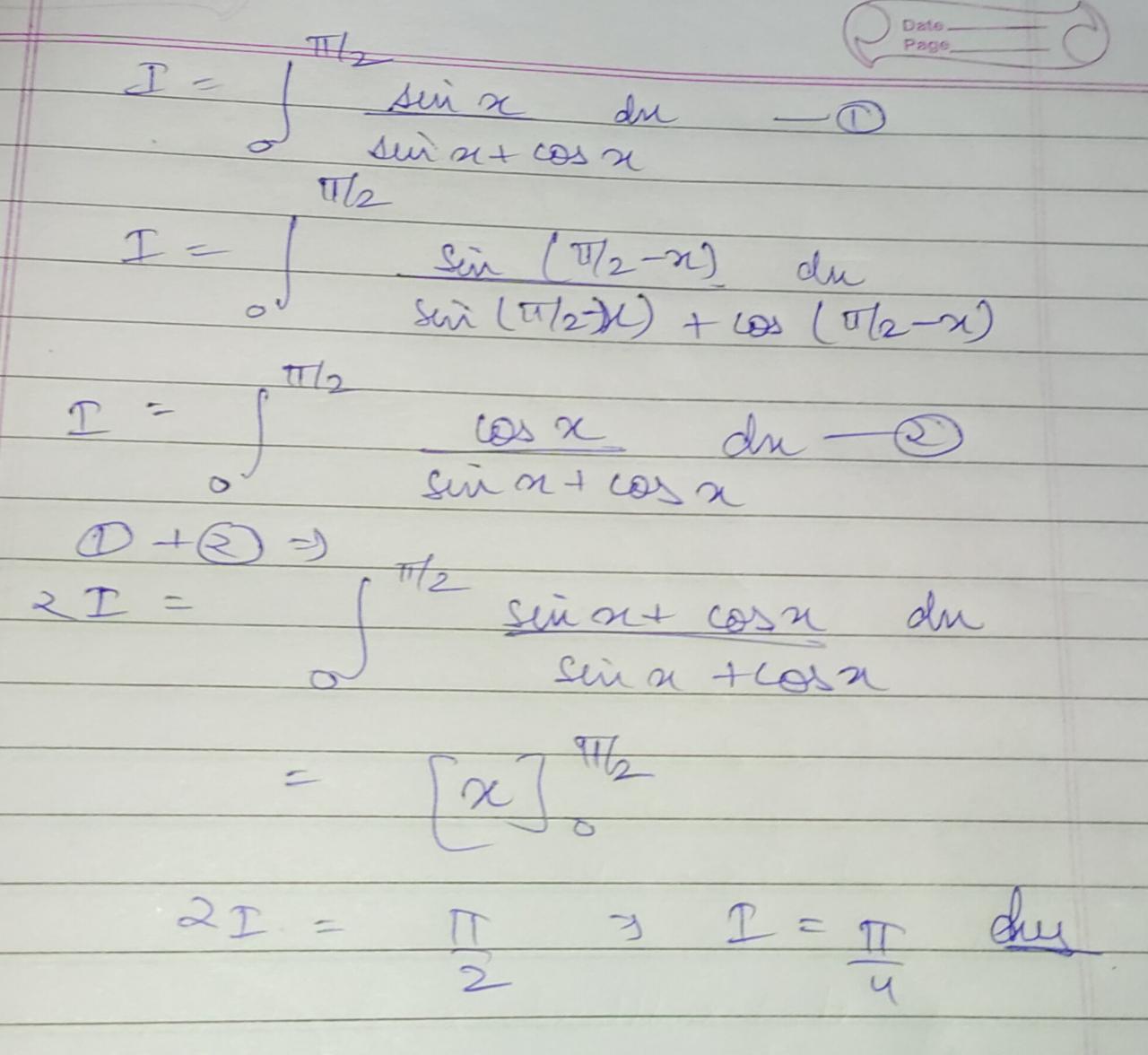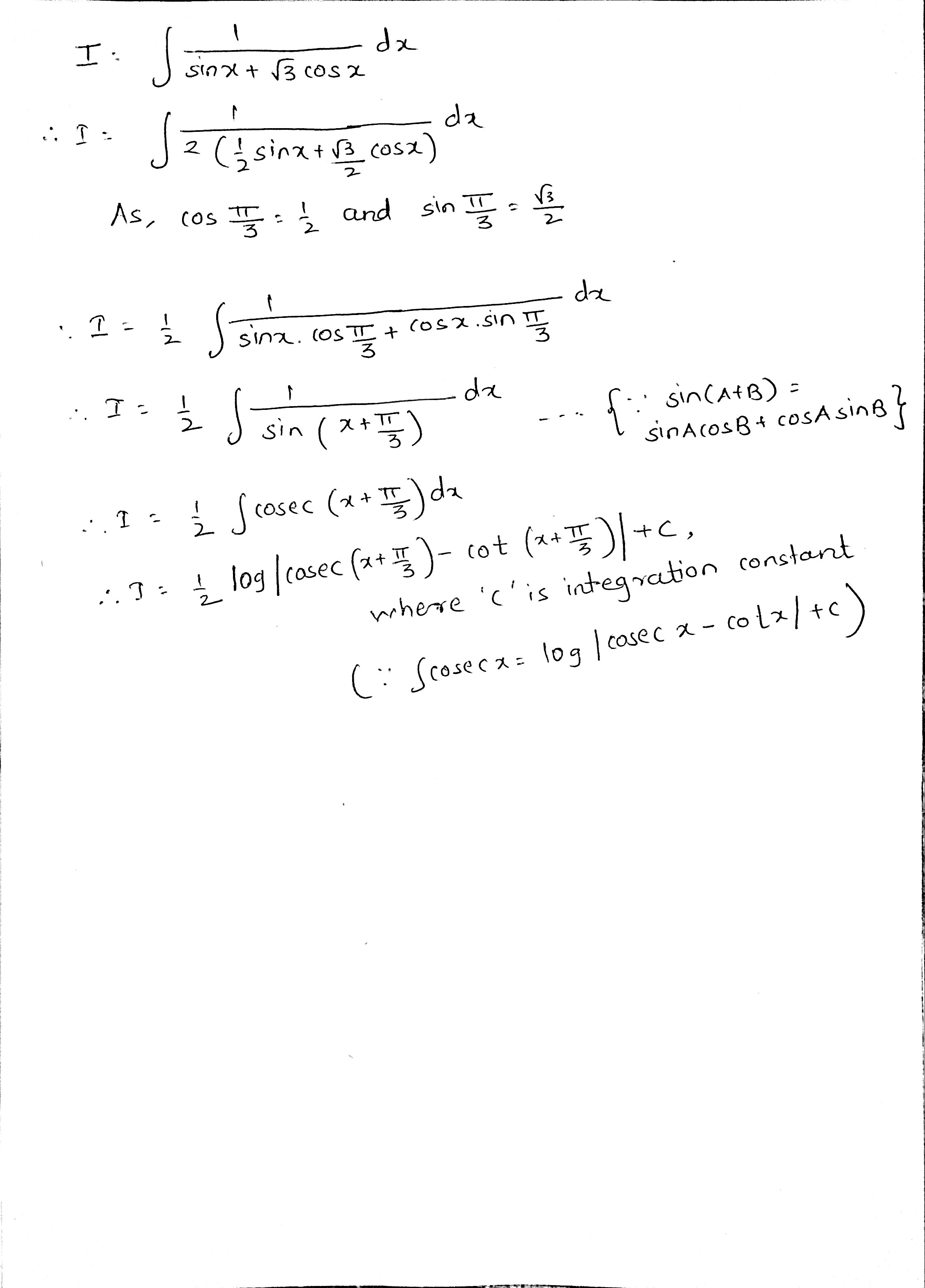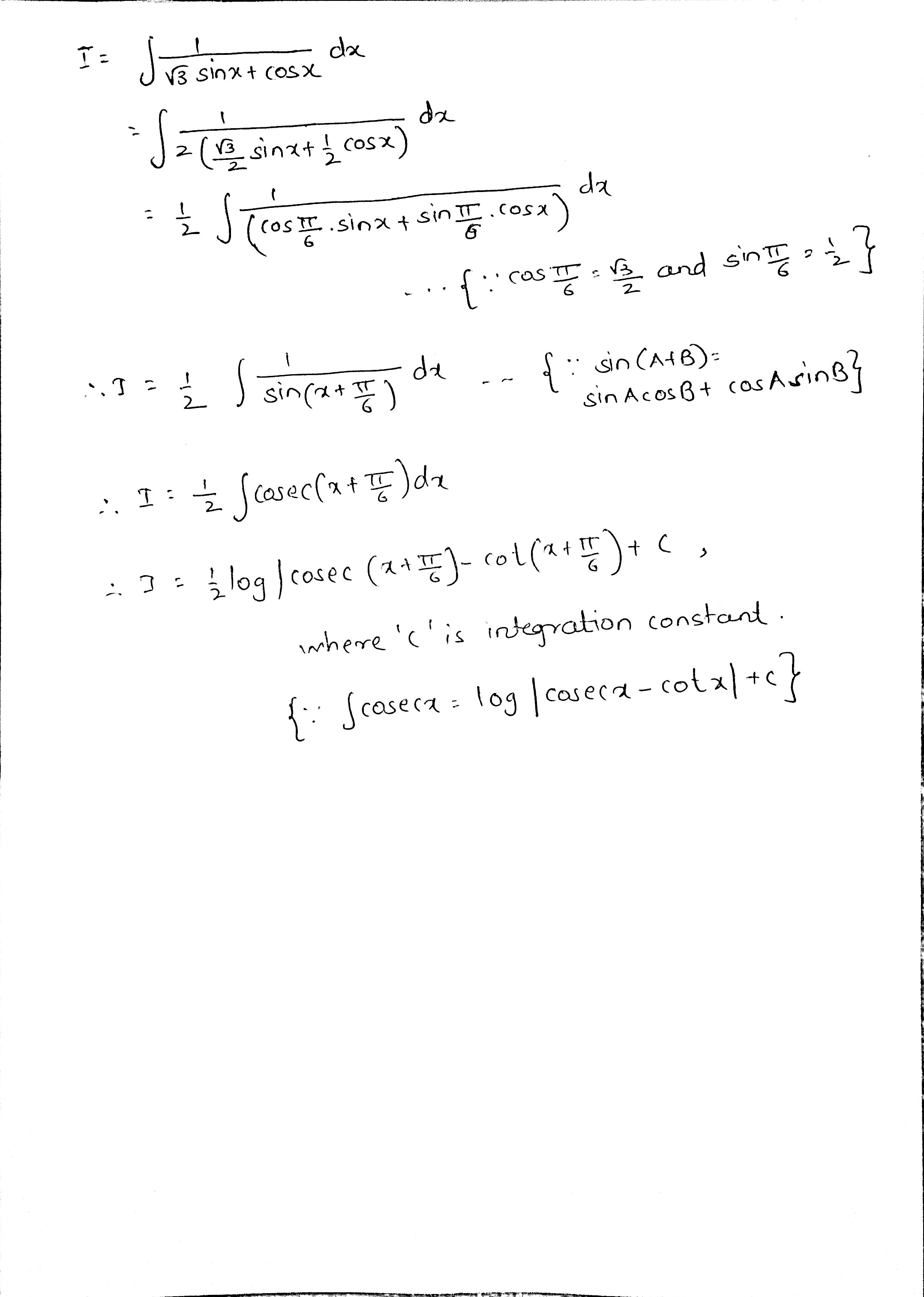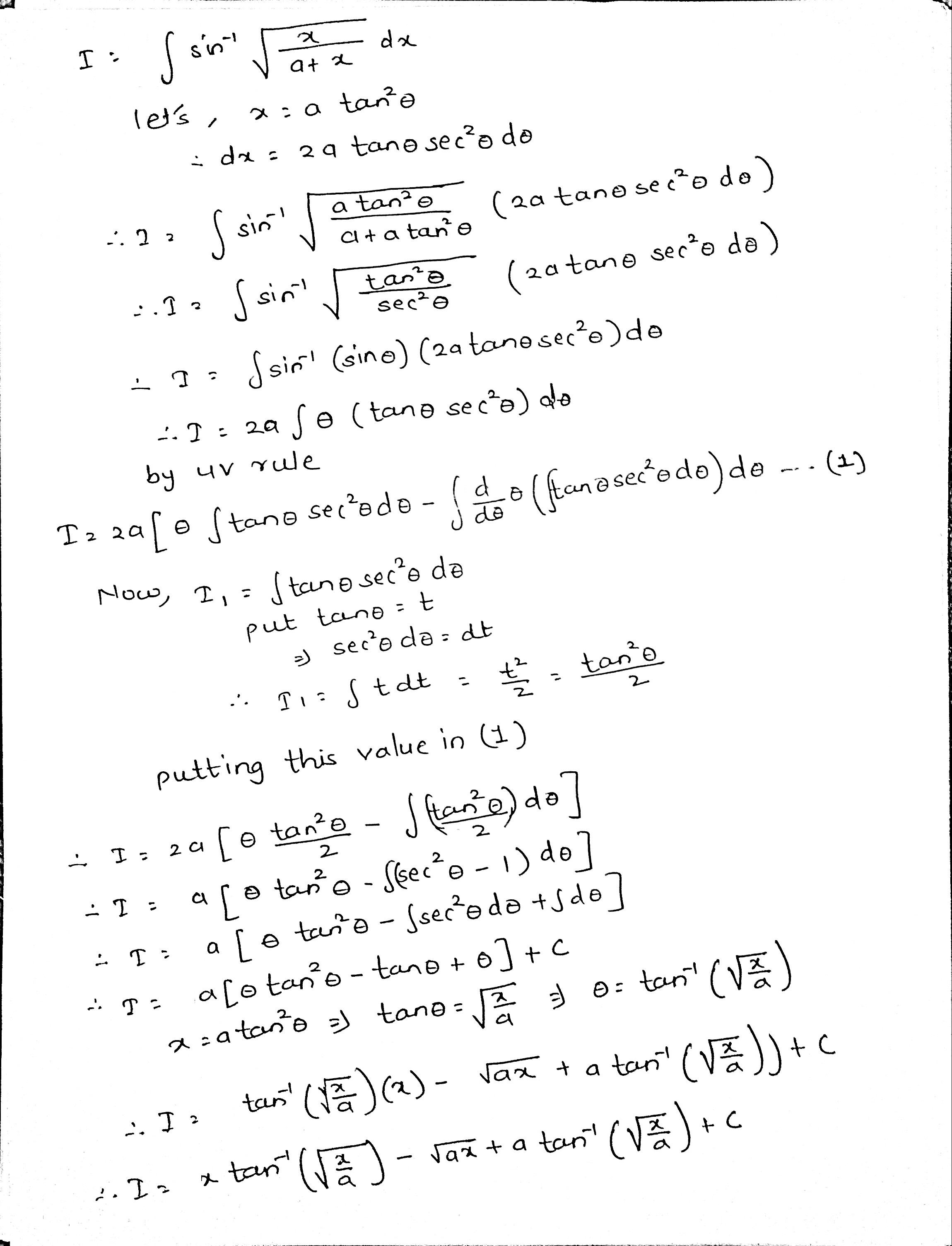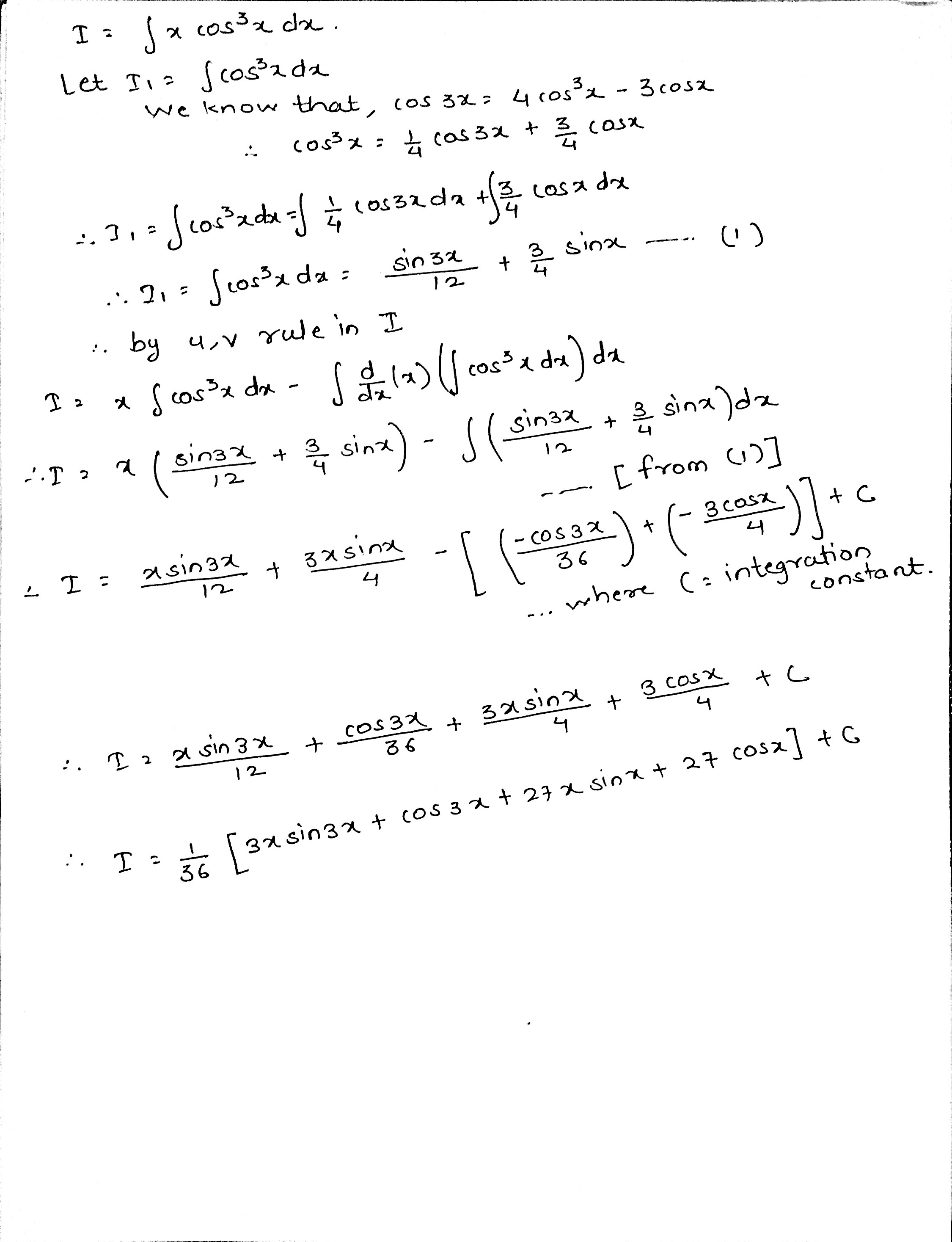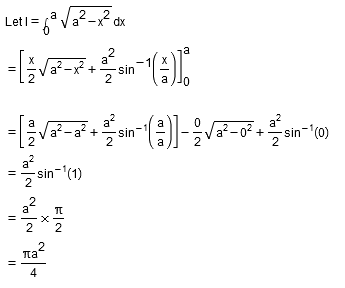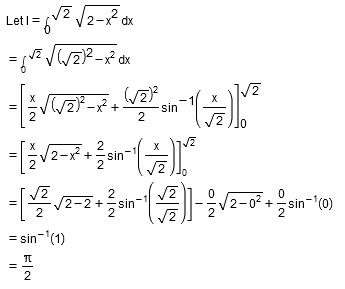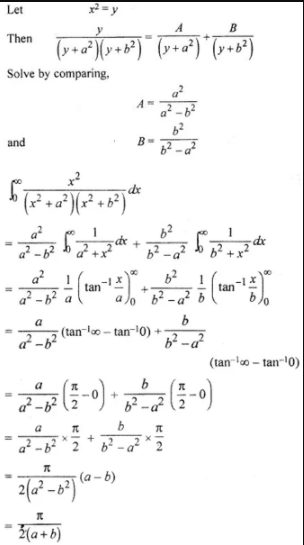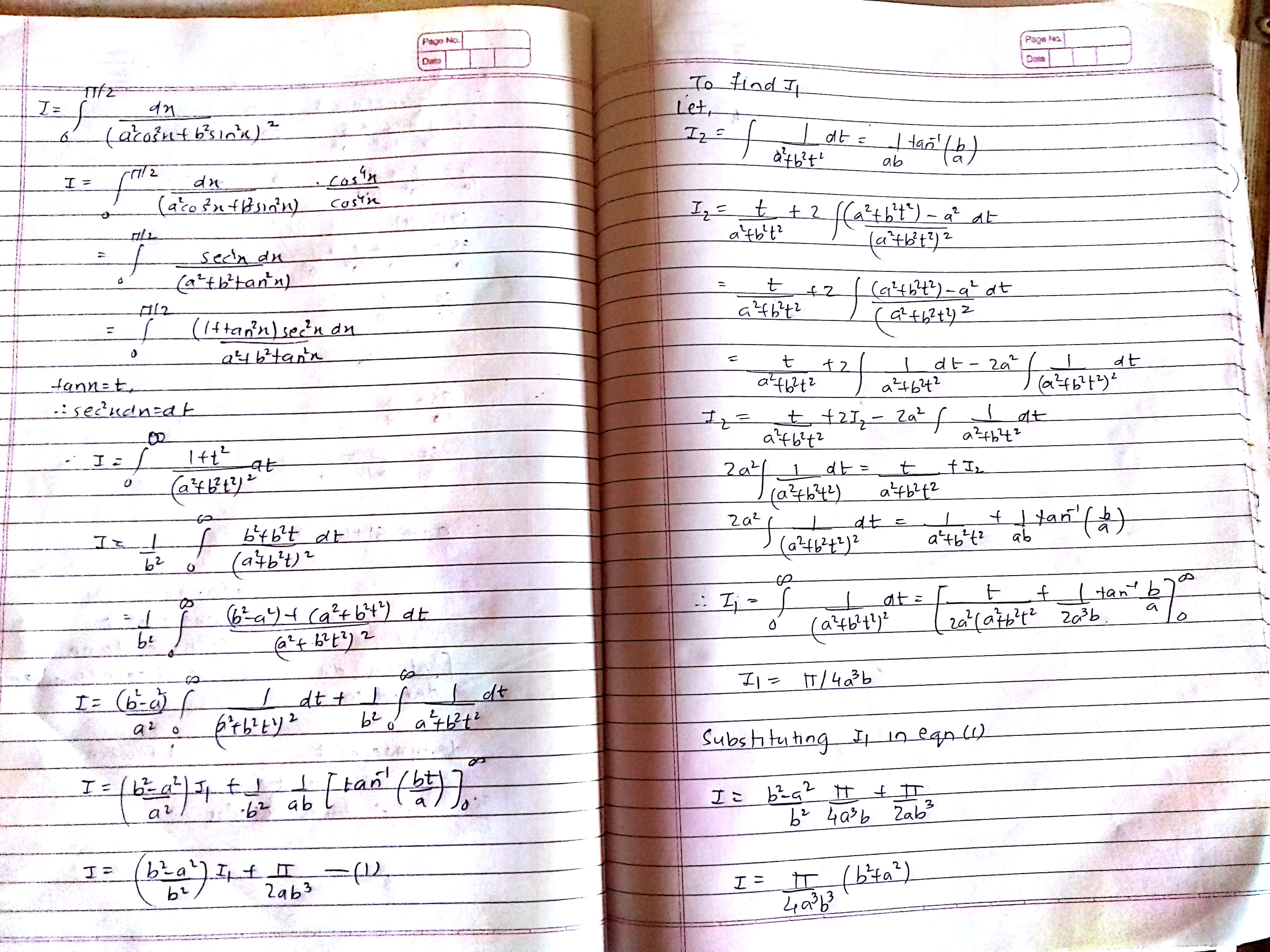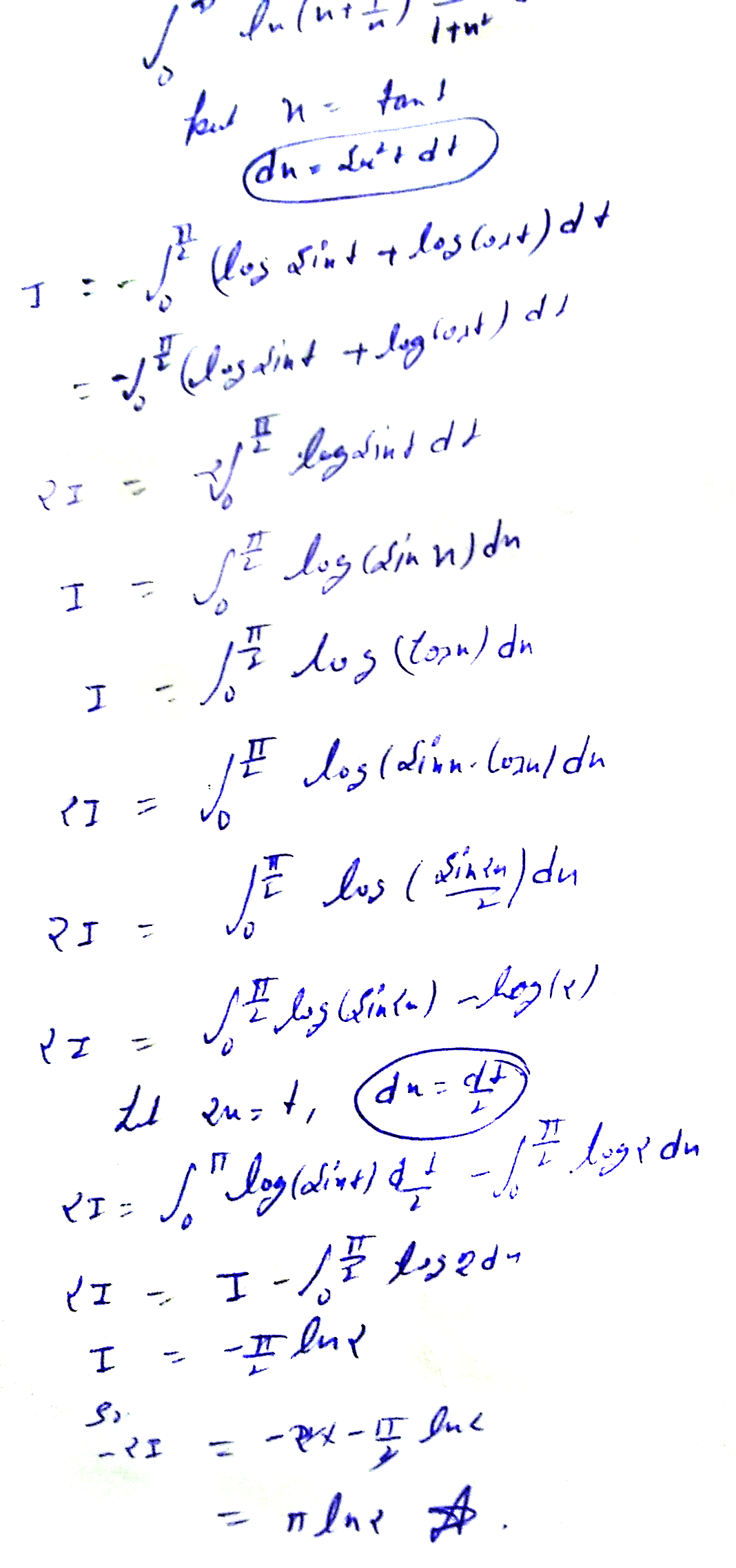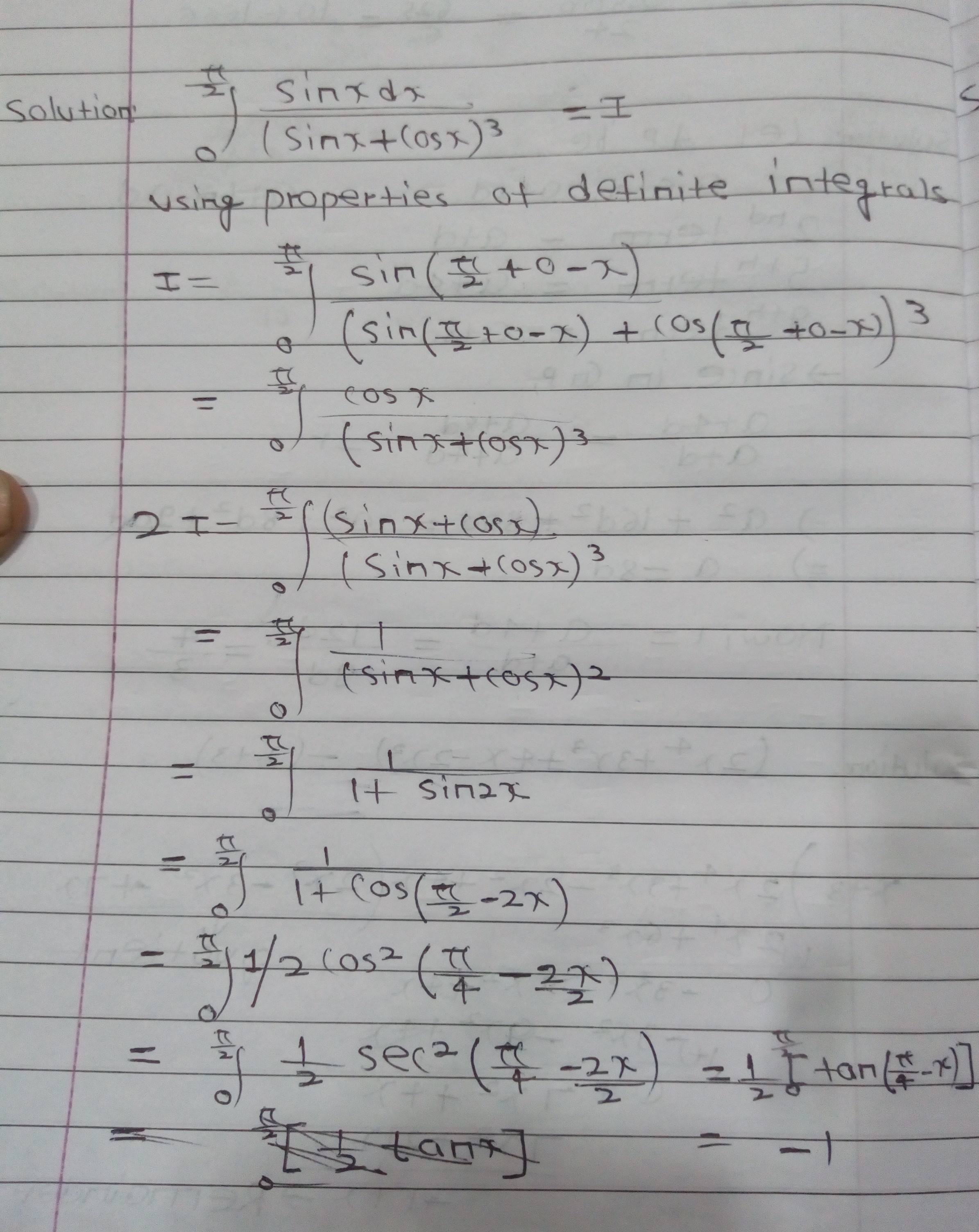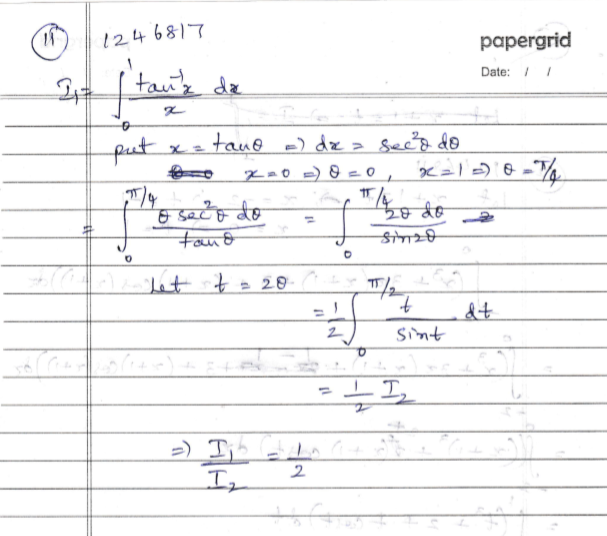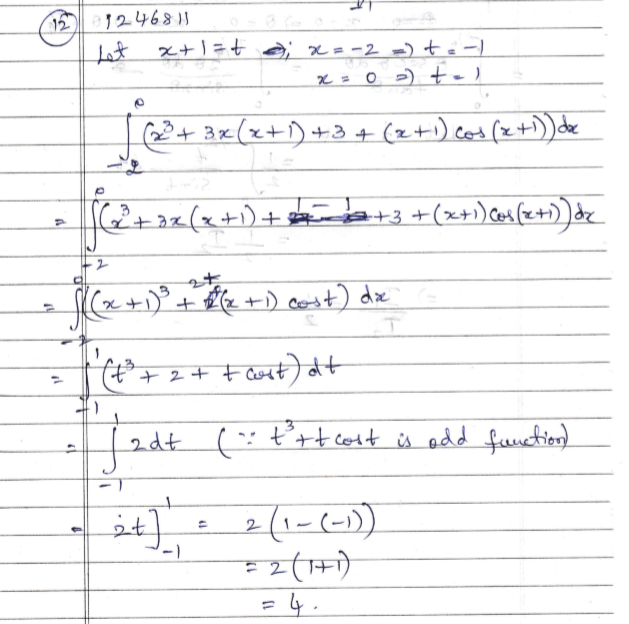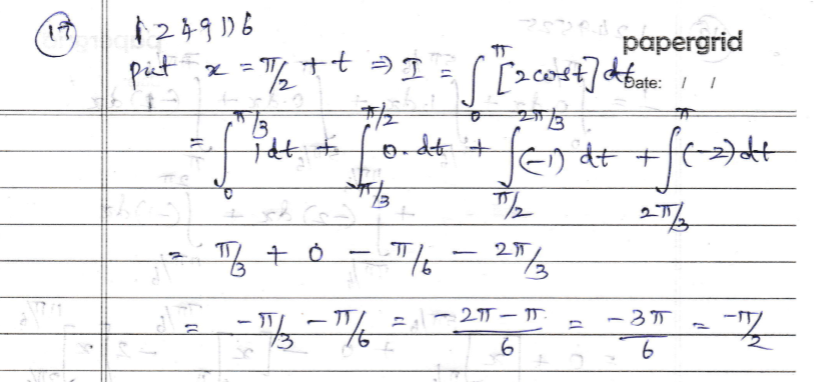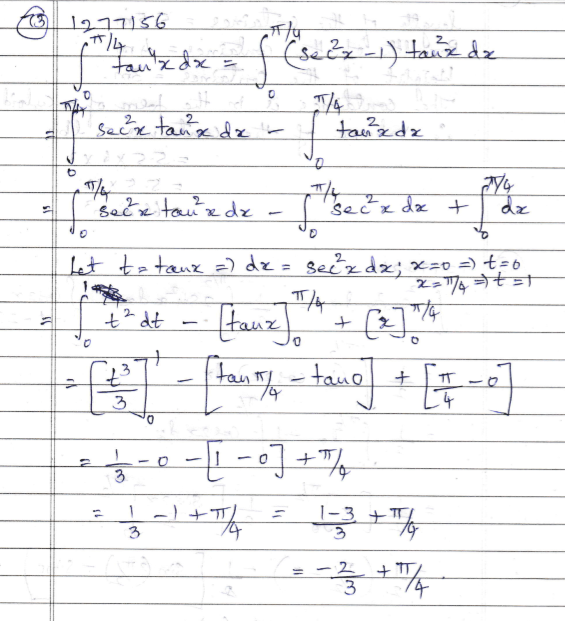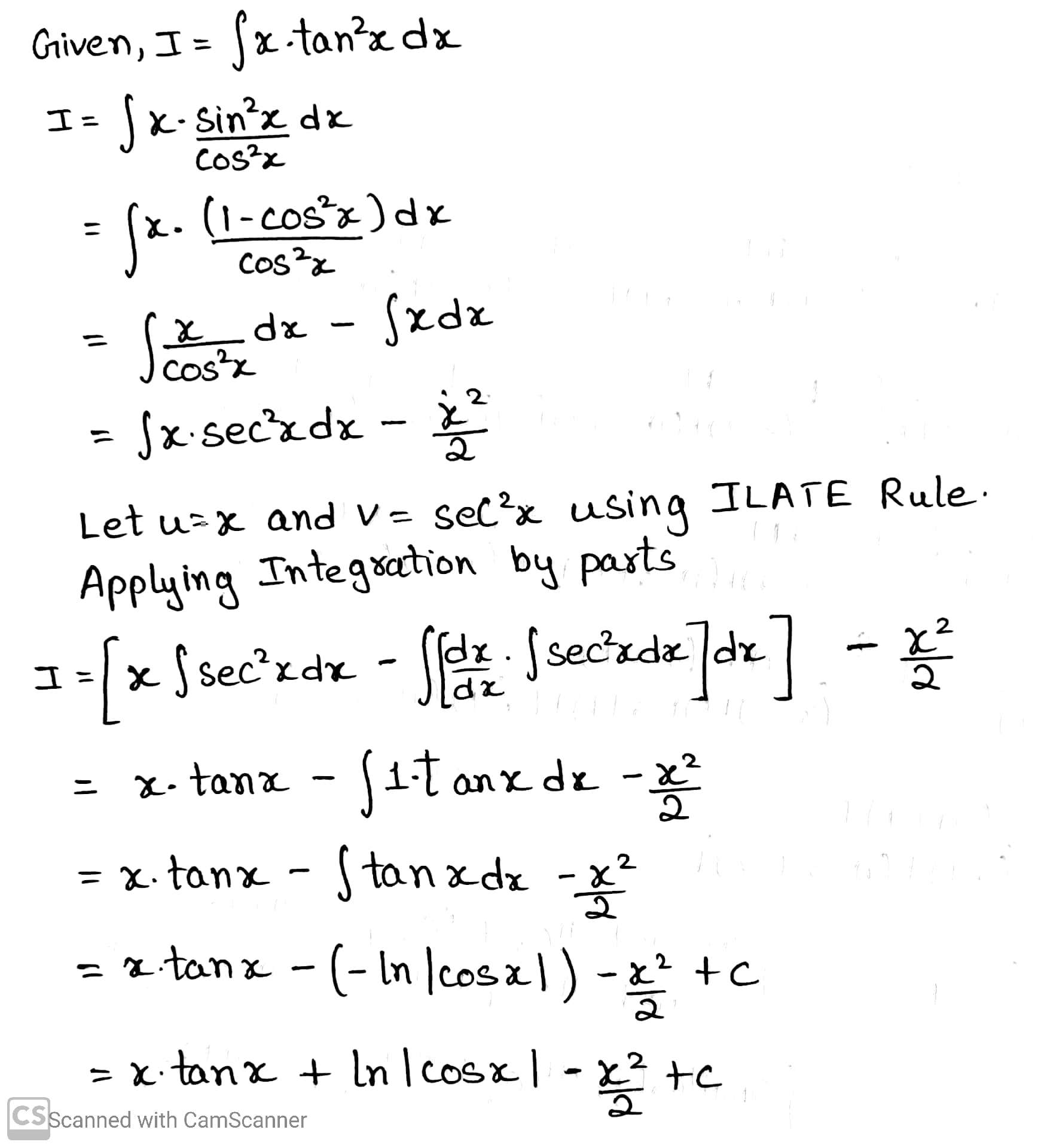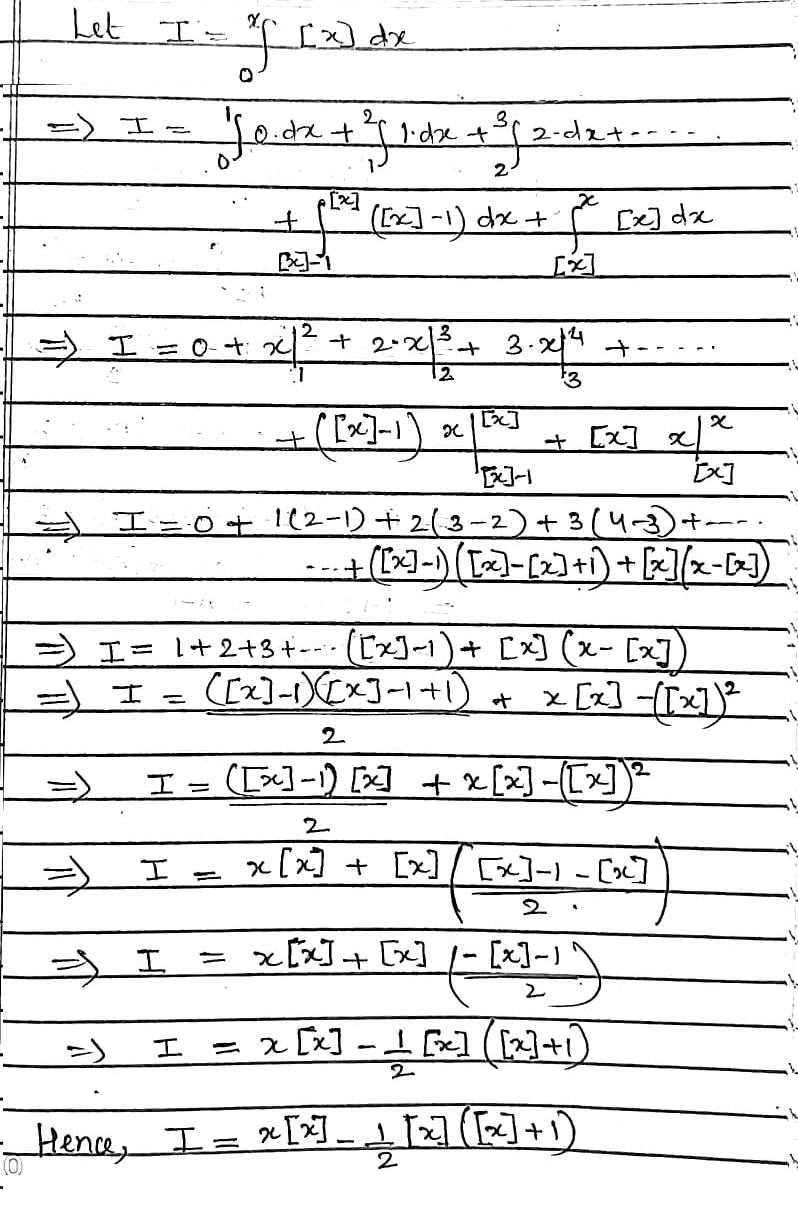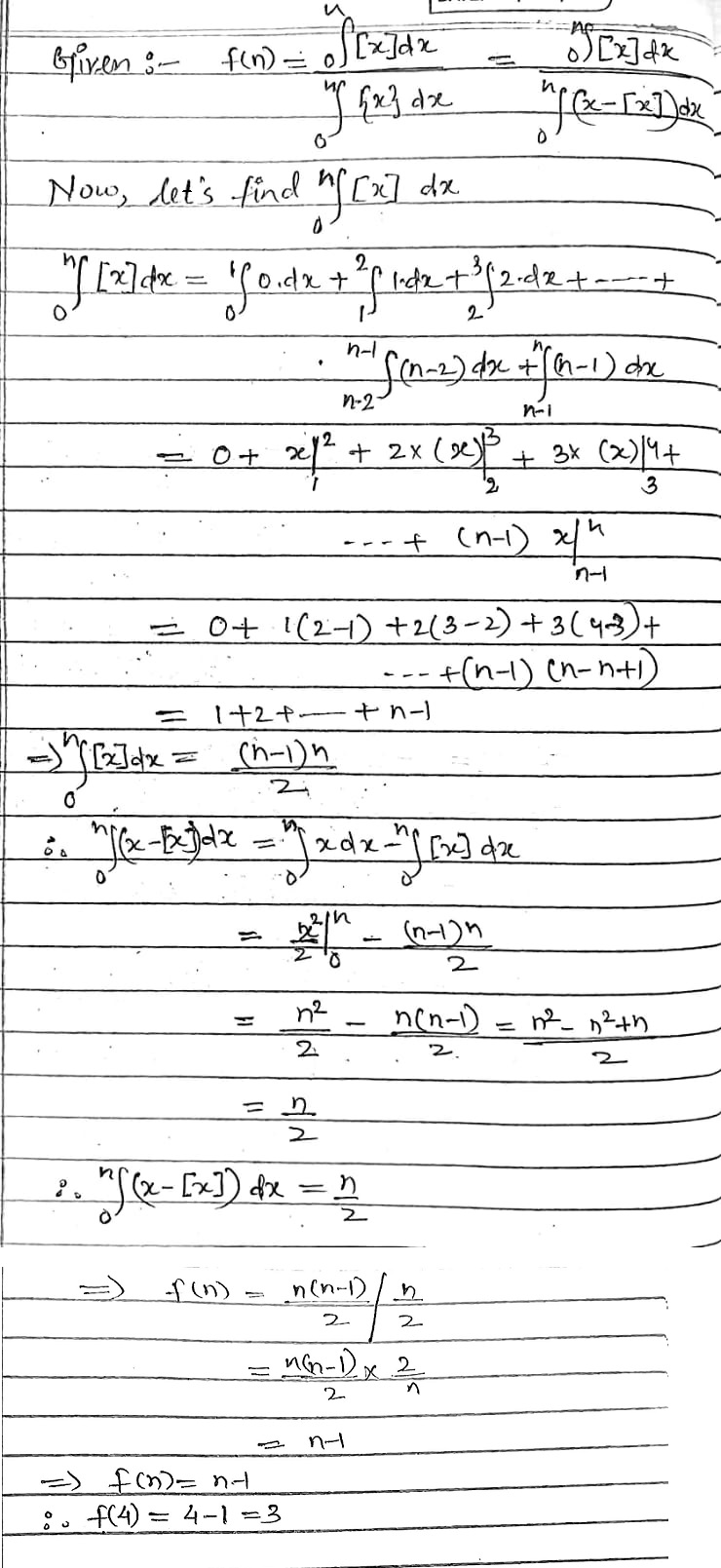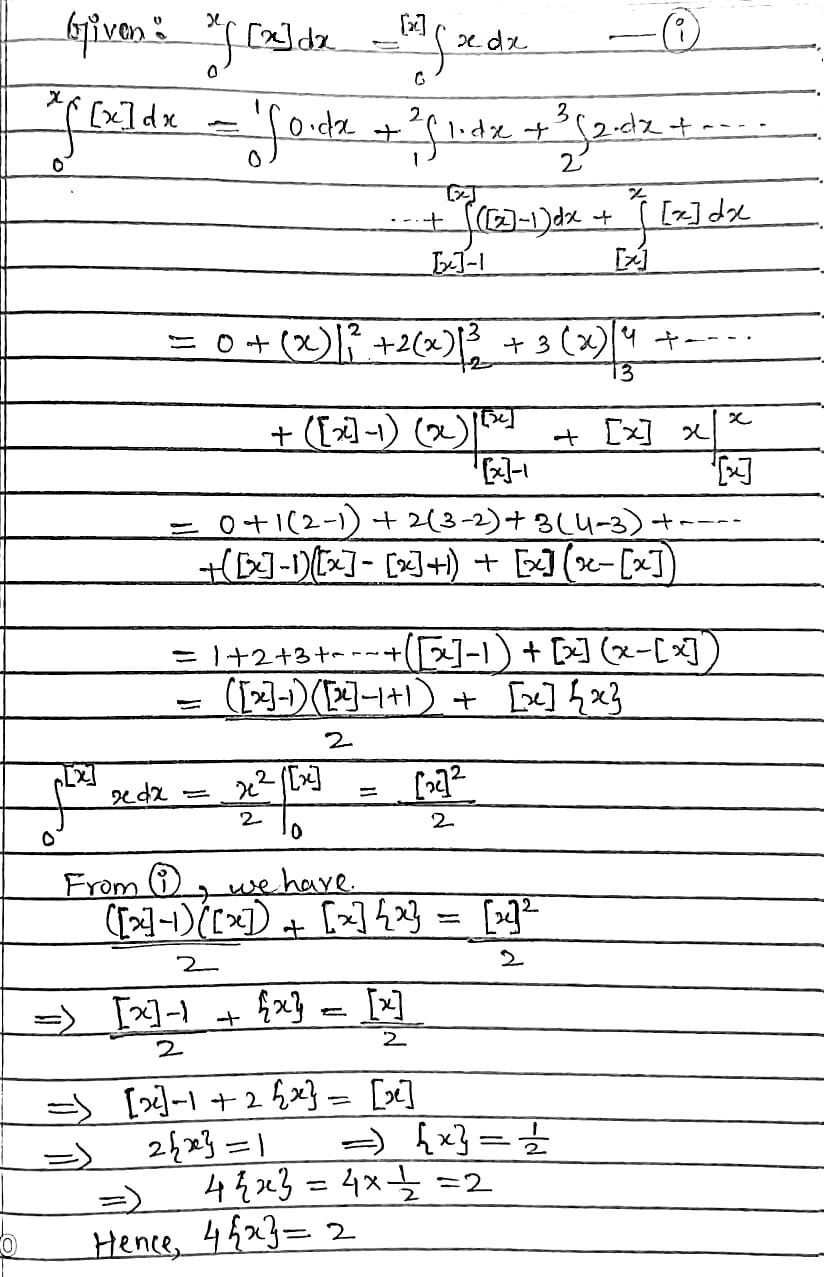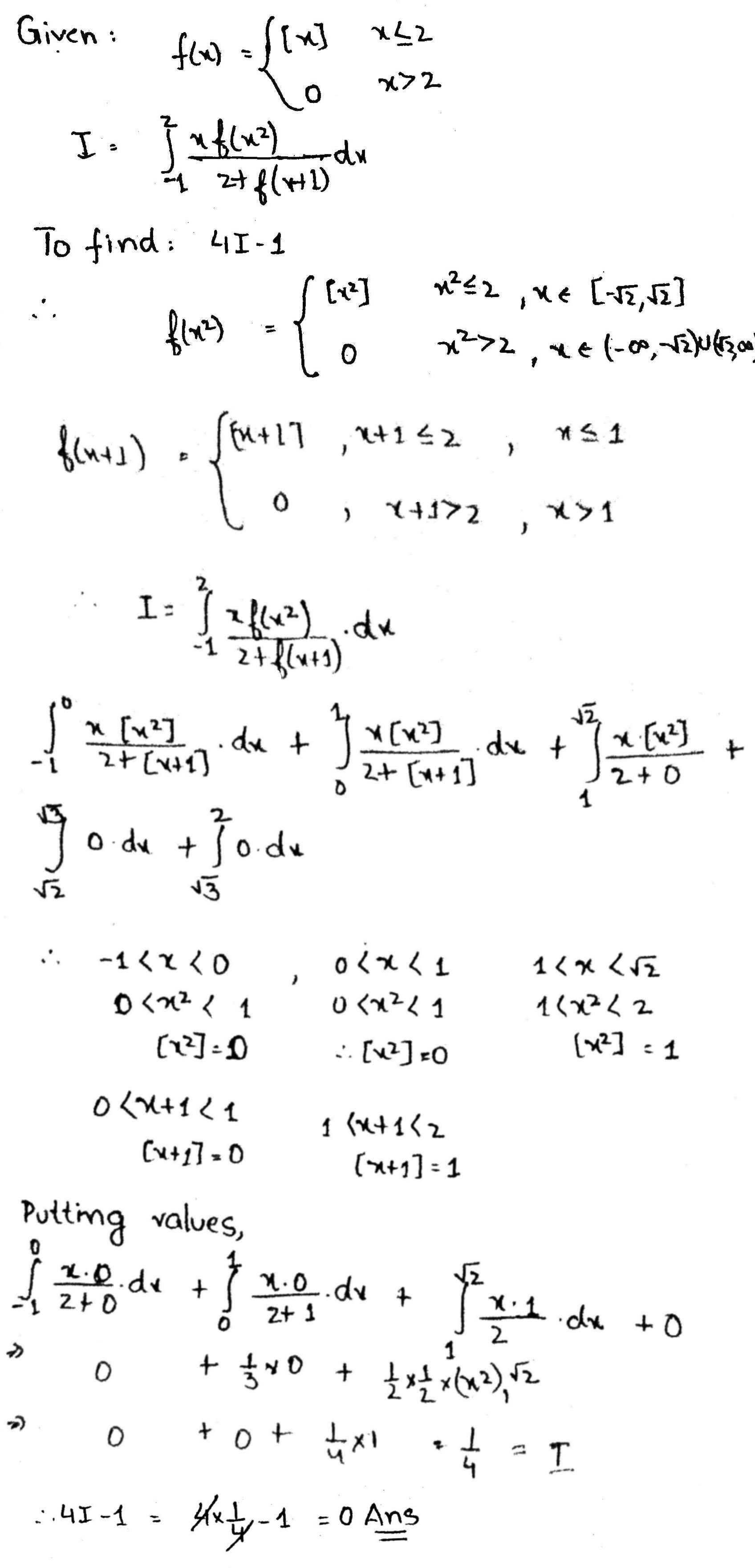Definite Integrals - Class 12 Commerce Applied Mathematics - Extra Questions
If $$\displaystyle \alpha = \int_0^{1} { \left (e^{ \left (9x + 3\tan^{-1}x \right) } \right) } \left( \dfrac{12+9x^2}{1+x^2} \right) dx $$ , where $$\tan^{-1} x $$ takes only principal values, then the value of $$ \left ( \log_e |1 +\alpha| - \dfrac{3\pi}{4} \right)$$ is
Evaluate :$$\int \dfrac{\cos \sqrt{x}}{\sqrt{x}}dx$$
Evaluate the integral
$$\displaystyle \int _{ 4 }^{ 5 }{ \left( { x }^{ 2 }-12x+8 \right) dx } $$
The value of $$\left(\int_{0}^{\pi/6} sec^{2} x dx\right)^2$$ is:
If $$y=2^23^{2x}5^{-5}7^{-5}$$ then $$\dfrac{dy}{dx}=$$
Find $$\displaystyle \int_{0}^{\pi/2} \sin x. \sin 2x\ dx$$
Solve: $$\int\limits_0^{\frac{\pi }{2}} {{{\sin }^2}x{{\cos }^3}xdx} $$
Find the value $$\displaystyle\int\limits_{-\dfrac{\pi}{2}}^{\dfrac{\pi}{2}} \sin^{2017}x\cos ^{2018}x\ dx$$.
$$\int \dfrac{1+x}{\sqrt{1-{x}^{2}}}$$dx
Evaluate $$\displaystyle \int_0^\pi {\frac{{{x^2}\sin 2x.\sin \left( {\frac{\pi }{2}\cos x} \right){\rm{ dx}}}}{{\left( {2x - \pi } \right)}}} $$
The value of integral $$\int _{ -1 }^{ 3 }{ \left( \tan ^{ -1 }{ \left( \dfrac { x }{ 1+{ x }^{ 2 } } \right) } +\tan ^{ -1 }{ \left( \dfrac { { x }^{ 2 }+1 }{ x } \right) } \right) dx }$$
$$\displaystyle \int_0^{\dfrac{\pi }{4}} {\dfrac{{\sin x\cos x}}{{{{\cos }^4}x + {{\sin }^4}x}}} \,dx$$
$$\int_{ - 1}^2 {\sqrt {5x + 6} } dx$$
solve $$\int\limits_0^{11/2} {\frac{{{{\sin }^2}x}}{{{{\sin }^2}x + {{\cos }^2}x}}} dx$$
Solve: $$\displaystyle \overset{\cfrac{\pi}{3}}{\underset{\cfrac{\pi}{6}}{\int}}\cos x \,dx$$
Evaluate :$$\displaystyle \int\limits_{0}^{2\pi} \cos^5x \ dx$$
Evaluate:$$\displaystyle\int\limits_{0}^{1}\dfrac{x}{x^2+1}dx$$
Evaluate :$$\displaystyle \int\limits_{0}^{\pi/2} \cos^2x \ dx$$
Evaluate the following
$$\int_{1}^{3} \dfrac {\cos (\log x)}{x} dx$$.
Find the value of $$\displaystyle \int_{0}^{(\pi/2)^{1/3}} x^{5}.\sin x^{3}\ dx$$
$$\displaystyle\int _{ 0 }^{ \infty }{ \dfrac { \log{ x } }{ 1+x^{ 2 } } } dx$$
Solve : $$\underset{0}{\overset{\pi / 4}{\int}} 2 \sin \, x \, \sin 2 x \, dx$$
$$\int^{1}_{0}\sqrt {x(1-x)}dx$$
Solve:$$\displaystyle \int_0^{\pi/4} \tan^3{x}\ \sec\ x\ dx$$
Evaluate;
$$\int_0^{\frac{2}{3}} {\frac{{dx}}{{4 + 9{x^2}}}} $$
Evaluate the following definite integral:
$$\displaystyle \int _{0}^1 \dfrac {1-x}{1+x}dx$$
$$\int_{0}^{4}x+e^{x} dx $$
Solve
$$\int_{0}^{2} \cos x dx$$
$$\int _{ 0 }^{ 2 }{ x\sqrt { x+2 } } $$ (Put $$x+2={ t }^{ 2 }$$)
Solve:$$\displaystyle \int_{-\pi/2}^{\pi/2}\sin^2x dx$$
Evaluate the following definite integral:$$\displaystyle \int_{0}^{1} \dfrac {2x+3}{5x^2 +1}dx$$
Evaluate the following definite integral:
$$\displaystyle \int_{0}^{1} \dfrac {2x+3}{5x^2 +1}dx$$
Evaluate : $$\displaystyle \int _{ 0 }^{ \pi /4 }{ { \tan }^{ 3 }x .{ \sec }^{ 2 } x dx } $$
$$I=\int_{0}^{\pi /2}\dfrac{1+2cosx}{(2+cosx)^{2}}$$dx
Solve
$$\displaystyle \int_{0}^{\pi} \dfrac{x\ dx}{1+ \sin x}$$
Evaluate $$\int _{ 0 }^{ 1 }{ \left( { x }^{ 3 }+1 \right) } $$ dx
$$\displaystyle \int _{ 0 }^{ 1 } (x^2+ 2x) dx$$
Evaluate:$$\displaystyle \int_{0}^{\pi /2} {1+\sin x} dx$$
Evaluate $$\displaystyle\int_{0}^{\pi/2}\dfrac{\sin x\cos x}{1+\sin^{4}x}dx$$
Evaluate the definite integrals :
$$\displaystyle \int_{0}^{\pi /2} ({1+\cos x}) dx$$
$$\displaystyle \int _{ 0 }^{ 1 } x^2+ 2x dx$$
Evaluate the following definite integrals :
$$\displaystyle \int_{0}^{3}x^2 \ dx$$
$$\displaystyle\int_{0}^{1}(1-x^{2}) \ dx$$
Evaluate the following integral:$$\displaystyle\int_{0}^{1}\sqrt x \ dx$$
$$\displaystyle\int_{0}^{\pi/2} \sin x \cos x\ dx$$
Evaluate the definite integral :
$$\displaystyle \int _{0}^{\pi /2} \cos^2 x\ dx$$
Evaluate the definite integral :$$\displaystyle \int _{0}^1 \dfrac {1-x}{1+x}dx$$
Evaluate$$\displaystyle\int_{0}^{1}\dfrac{1-x^{2}}{(1+x^{2})^{2}}dx$$
Evaluate the following definite integral:
$$\displaystyle \int _2^3 x^2+2x+5 \ \ dx$$
Evaluate the following integral:$$\displaystyle\int_{0}^{\pi} x\ dx$$
Evaluate the following definite integral:
$$\displaystyle\int_{0}^{1}\dfrac{1-x^{2}}{(1+x^{2})^{2}}dx$$
Evaluate $$\displaystyle \int _2^3 x^2+2x+5 \, dx$$
Evaluate the following definite integral:
$$\displaystyle \int_0^{1}(3x^2+2x)dx$$
Solve $$\displaystyle \int_{1}^{2}{(x+3)}\ dx$$
Evaluate $$\displaystyle \int_{0}^{2}(x^2+2x +1)dx$$
Evaluate the given integral.
$$\displaystyle \int_{0}^{5} x^2dx$$
The value of $$\displaystyle \int _{0}^{1}x^2+2 dx$$ is equal to ?
The value of $$\displaystyle \int _{0}^{1}x^2+2 \ dx$$ is equal to ____ .
The value of $$\displaystyle \int _{0}^{1}x^2+2 \ dx$$ is equal to ____ .
Show that $$\displaystyle \int_{0}^{1}\frac{1}{\left ( 1+x^{2} \right )^{3/2}}dx=\frac{3}{\sqrt{\left ( 2 \right )}}$$
$$\displaystyle \int_{0}^{\infty }\frac{dx}{\left ( x+\sqrt{1+x^{2}} \right )^{n}} = f(n)$$
Find the value if $$n=6$$, can be expressed as $$a/b$$ in simplest form, then $$b-a = ?$$
$$\displaystyle \int_{0}^{\pi }x\log \sin x= \frac{\pi ^{k}}{m}\log \frac{1}{n}.$$.Find $$k+m+n$$ ?
$$\displaystyle \int_{0}^{\pi /2}\frac{\cos x dx}{1-\sin ^{2}x+\sin ^{4}x}=\frac{\pi }{k}+\frac{1}{4\sqrt{(3)}}log(\dfrac{(2+\sqrt{3})}{(2-\sqrt{3})})$$. Find the value of $$k$$.
Evaluate the integral $$\displaystyle \int_0^1\frac {x}{x^2+1}dx$$ using substitution.
Evaluate $$\displaystyle\int _{ 1 }^{ 5 }{ \frac { dx }{ \sqrt { 2x-1 } } } $$.
Find $$\begin{pmatrix}\int ^{\pi /4}_0 \dfrac{dx}{\cos^3 x\sqrt{2\sin2x}}\end{pmatrix}$$.
Evaluate $$\int \int_{R} e^{-(x^{2} + y^{2})}dx dy$$, where $$R$$ is the region bounded by the circle $$x^{2} + y^{2} = a^{2}$$.
$$\int_{0}^{5}x^{3} (25 - x^{2})^{7/2} dx$$.
Use the substitution $$u={ e }^{ x }$$ to evaluate
$$\displaystyle \int _{ 0 }^{ 1 }{ \sec { hx } } dx$$
$$\displaystyle\int^{\pi}_{-\pi}\frac{\cos^2x}{1+a^x}dx=?$$
$$\int _{ 0 }^{ \cfrac { \pi }{ 2 } }{ \sqrt { 1-\sin { 2x } } } dx$$ is equal to
Find all numbers $$\alpha$$ for which $$\displaystyle\, \int_{1}^{2}[\alpha^2 \, + \, (4 \, - \, 4\alpha)x \, + \, 4x^3]dx \leqslant 12$$
Find the area of the figure bounded by the following curves
Find all values of a for which the inequality $$\displaystyle \int_{0}^{a} \, x \, dx \, \leqslant \, a \, + \, 4$$ is satisfied.
Evaluate $$\displaystyle \int _{ 0 }^{ 2/3 }{ \cfrac { dx }{ \left( 4+9{ x }^{ 2 } \right) } } $$
Evaluate: $$\displaystyle \int_{\frac{\pi}{2}}^{\pi}\frac{1-sinx}{1-cosx}dx$$
Let $$T= \int_0^{\ln2} \frac{3e^{3x} + 2e^{2x} }{e^{3x}+e^{2x} +1} dx $$, then $$e^T=\frac{p}{q} $$ where $$p$$ and $$q$$ are coprime to each other, then find the value of $$p+q$$ is
Integrate $$\int\limits_0^1 {{x \over {1 + {x^2}}}dx} $$
Evaluate $$\displaystyle\int_0^{\tfrac{\pi }{2}} {\sqrt {\sin \phi } \, {{\cos }^5}\phi d\phi } $$
Prove that $$\int\limits_0^{\tfrac {32\pi} 3} {\sqrt {1 + \cos 2x} \,dx = \sqrt {\frac{3}{2}} } $$
Evaluate: $$\displaystyle \int\limits_0^{\frac{\pi }{4}} {{{\cos }^{\frac{3}{2}}}\left( {2x} \right)\cos \left( x \right)dx} $$
Prove that: $$\int_0^{\pi /4} {\dfrac{{dx}}{{{{\cos }^3}x\sqrt {2\sin 2x} }}} = \dfrac{6}{5}$$
$$x_{CM} = \frac{\int x dm}{\int dm} = \frac{\int\limits_0^1 x (1 + 2x) dx}{\int\limits_0^1(1 + 2x) dx}$$
Find
$$\displaystyle \int_0^{1/4 \pi} ln(1 + \tan x )dx$$.
Evaluate:$$\displaystyle\int^2_1\dfrac{dx}{x(x^4+1)}$$.
Solve $$\int\limits_2^6 {\sqrt {\left( {6 - x} \right)\left( {x - 2} \right)} dx} $$
$$\displaystyle\int^{1}_0\sin^{-1}\left(\dfrac{2x}{1+x^2}\right)dx$$.
Evaluate:
$$\displaystyle \int _{ 0 }^{ 1 } x^3+ 3x^2 dx$$
The value of $$\displaystyle\int_{0}^{\dfrac{\pi}{2}}{\dfrac{dx}{1+{\tan}^{3}{x}}}$$ is
Evaluate the integrals using substitution.
$$\displaystyle\int^2_0x\sqrt{x+2}$$ (Put $$x+2=t^2$$).
$$\displaystyle\int^{\dfrac{\pi}{2}}_0\dfrac{\sin x}{1+\cos^2x}dx$$.
Solve :
$$\int_2^4 {\frac{{dx}}{x}} $$
$$\displaystyle \int_2^4 (6x^3 + 5x) dx =$$
$$\displaystyle\int^{\dfrac{\pi}{4}}_0\dfrac{x\sin x}{\cos^3x}dx$$.
Evaluate $$\displaystyle \int_0^{\frac{\pi }{4}} {\frac{{dx}}{{{a^2}{{\cos }^2}x - {b^2}{{\sin }^2}x}}} $$
Solve :- $$\displaystyle \int_0^1 \ 3^x dx$$
Solve:$$\displaystyle \int_0^{\pi/2}sinx \cos^3 xdx$$
$$\int _{ 0 }^{ \dfrac { \pi }{ 2 } }{ \dfrac { \sin { ^{ 2 }x } }{ \sin { x } +\cos { x } } dx } =-\dfrac { 1 }{ 2\sqrt { 2 } } \log { \left(-2 \sqrt { 2 } +3\right) } $$
Solve it :-
$$\int\limits_{\pi /4}^{\pi /2} {\sqrt {1 - \sin 2x\,} \,\,dx} $$
Find m if :$$\displaystyle \int_{0}^{\pi}\left ( \dfrac{\sqrt{1+\cos\ 2x}}{2} \right )dx=\sqrt m$$
Prove that $$\displaystyle\int _ { 0 } ^ { \dfrac { \pi } { 4 } } \dfrac { \sin x \cos x } { \cos ^ { 4 } x + \sin ^ { 4 } x } d x$$
Integrate the following:$$\displaystyle \int\limits_{\pi /3}^{\pi /2} {{{(\tan x + \cot x)}^2}dx} $$
$$\int\limits_0^{\pi /2} {\dfrac{{\sin x\cos x}}{{1 + {{\sin }^4}x}}dx = } $$
Evaluate $$\int\limits_0^1 {\dfrac{{2x}}{{5{x^2} + 1}}dx} $$
Solve : $$\displaystyle \int_{0}^{2}{x\sqrt{x+2}dx}$$
$$\displaystyle \int _{ 2 }^{ 3 }{ \left( 1+2x \right) } dx$$
Solve:$$\displaystyle \int_{-\pi/2}^{\pi/2} \log \left(\dfrac{2-\sin x}{2+\sin x}\right)dx$$
Solve:$$\int cos^{2}xsin^{2}xdx.$$
Evaluate: $$\int\limits_0^{\dfrac{\pi }{2}} {\cos x\;{e^{\sin x}}\;{\text{dx}}} $$
$$\displaystyle \int_0^{\pi} {\dfrac{xdx}{{a^2}{{\cos }^2}x + {b^2}{{\sin }^2}x}} = {{{\pi ^2}} \over {2ab}}$$
Solve:
$$\displaystyle\int_0^{\frac{\pi }{2}} {{\left( {\sin 2x} \right)} \sin xdx} $$
Evaluate:
$$\int\limits_{\pi /4}^{\pi /2} {\sqrt {1 - \sin 2x} } dx$$
Solve :
$$\displaystyle \int_{0}^{\pi}{\sin^{3}x dx}$$
Solve
$$\displaystyle \int_{0}^{\pi} \dfrac{dx}{5+4 \cos 2x}$$
Solve: $$\displaystyle\int _{ 0 }^{ 1 }{ \dfrac { 1 }{ { 2x }^{ 2 }+x+1 } dx } $$
$$\int _{ 2 }^{ 4 }{ \frac { x }{ { x }^{ 2 }+1 } } dx$$
Solve:$$\int _{ 0 }^{ \log { 2 } }{ \cos { 2x } dx } $$=
Evaluate: $$\displaystyle\int _{ { 1 }/{ \sqrt { 2 } } }^{ { \sqrt { 3 } }/{ 2 } }{ \frac { 1 }{ \sqrt { 1-{ x }^{ 2 } } } } dx$$
Evaluate $$\displaystyle \int_{0}^{\pi} \dfrac{x}{(a^{2} \cos^{2} x+b^{2} \sin^{2} x)^{2}}dx$$
Find : $$\displaystyle \int_0^1 \dfrac{ x}{1+x^{2}} d x $$
Evaluate $$\overset { 3 }{ \underset { 0 }{\int } } \dfrac{x}{\sqrt{x^2+16}}dx$$.
$$\displaystyle\int_{0}^{\pi /2}\frac{\sin x}{1+\cos^{2}x}dx$$
Solve: $$I=2\displaystyle\int _{ 0 }^{ \pi /2 }{ \frac { \sec ^{ 2 }{ x } }{ 1+3\tan ^{ 2 }{ x } } dx } $$
Integrate $$\displaystyle \overset { 7 }{ \underset { 4 }{ \int } } \dfrac{(11 - x)^2}{x^2 + ( 11 - x)^2} dx$$
Evaluate $$\int\limits_0^{\pi /2} {\dfrac{{\sin x}}{{\sin x + \cos x}}\;d} x.$$
Evaluate $$\displaystyle\int_{1}^{2}\dfrac{1}{x(1+\log x)^{2}}dx$$
$$I = \dfrac {2}{\pi}\int_{-\pi/4}^{\pi/4} \dfrac {dx}{(1 + e^{\sin x})(2 - \cos 2x)}$$ then find $$27I^{2}$$ equals ________.
Evaluate:$$\displaystyle\int_{0}^{\pi/4}\dfrac{\tan^{3}x}{1+\cos 2x}dx$$
Evaluate the definite integral :
$$\displaystyle \int_{e}^{e^2} \left\{\dfrac {1}{\log x} -\dfrac {1}{(\log x)^2}\right\} dx$$
Evaluate $$\displaystyle\int_{0}^{\pi/4}\dfrac{\tan^{3}x}{1+\cos 2x}dx$$
Evaluate $$\displaystyle\int_{-1}^{1}5x^{4}\sqrt{x^{5}+1}\ dx$$
$$\displaystyle\int_{0}^{\pi/4}\dfrac{\tan^{3}x}{1+\cos 2x}dx$$
Evaluate the following integrals :$$\displaystyle\int_{0}^{\pi/2}\dfrac{x\sin x\cos x}{\sin^{4}x+\cos^{4}x}\ dx$$
Evaluate the following definite integral:
$$\displaystyle \int_{1}^{2} e^{2x} \left (\dfrac {1}{x}-\dfrac {1}{2x^2}\right)dx$$.
Integrate $$\displaystyle \int_{2}^{3}(2x^2+1)dx$$
Evaluate $$\displaystyle \int_{1}^{3}(x^2+3x+e^{x})dx$$
Evaluate the following integrals
$$\int { \cfrac { 1 }{ 5-4\cos { x } } } dx$$
Evaluate the following integrals
$$\int { \cfrac { 1 }{ \sin { x } +\sqrt { 3 } \cos { x } } } dx$$
Evaluate the following definite integral:
$$\displaystyle \int _0^{\pi/2} \sin x \cos x dx $$ is equal to
Evaluate $$\displaystyle \int_{1}^{3}(3x^2+1)dx$$
Evaluate the following integrals
$$\int { \cfrac { 1 }{ 2+\sin { x } +\cos { x } } } dx$$
Evaluate the following integrals
$$\int { \cfrac { 1 }{ \sqrt { 3 } \sin { x } +\cos { x } } } dx$$
Evaluate the following integral
$$\int { \sin ^{ -1 }{ \sqrt { \cfrac { x }{ a+x } } } } dx$$
Evaluate the following integrals:
$$\displaystyle \int { \cfrac { 1 }{ { x }^{ 3 } } } \sin { \left( \log { x } \right) } dx\quad $$
Evaluate the following integral
$$\int { x\cos ^{ 3 }{ x } } dx\quad $$
Evaluate the following integrals:
$$\int { \sqrt { 4{ x }^{ 2 }-5 } } dx\quad $$
Evaluate the following integral:
$$\displaystyle\int^a_0\sqrt{a^2-x^2}dx$$.
Evaluate the following integral:
$$\displaystyle\int^{\sqrt{2}}_0\sqrt{2-x^2}dx$$.
If the value of the definite integral $$\int_{0}^{1} \frac{\sin ^{-1} \sqrt{x}}{x^{2}-x+1} d x=\frac{\pi^{2}}{\sqrt{n}}$$(where $$n \in N$$ ), then the value of $$n / 27$$ is
If $$ \int\left(x^{2010}+x^{\text {804 }}+x^{402}\right)\left(2 x^{160 8}+5 x^{402}+10\right)^{1 / 402} d x $$
$$ =\dfrac{1}{10 a}\left(2 x^{2010}+5 x^{804}+10 x^{402}\right)^{a / 402} . $$ Then $$ (a-400) $$ is equal to
Let $$f(x)=\displaystyle \int_{-2}^{x} e^{(1+t)^2}dt $$ and $$g(x)=f(h(x)), $$ where h(x) is defined for all $$x \in R.$$ If $$g'(2)=e^4$$ and $$h'(2)=1.$$ Then, absolute value of sum for all possible value of h(2), is ...
Find the value of the following integrals:
$$\displaystyle \int^{\beta}_{\alpha} \frac{dx}{(x - \alpha)(\beta - x)}, \beta > \alpha$$
Find the value of the following integrals:
$$\displaystyle \int^{\beta}_{\alpha} \frac{dx}{\sqrt{(x - \alpha)(\beta - x)}}, \beta > \alpha$$
Find the value of the following integrals:
$$\displaystyle \int^{1}_{0} \frac{x^3}{\sqrt{1 - x^2}} dx$$
$$\int_{1}^{2} \dfrac {x+3}{x(x+2)} dx$$
Find the value of the following integrals :
$$ \displaystyle \int _{-2}^{2} | 2x + 3 | dx $$
$$\int_{1/3}^{1} \dfrac {(x-x^3)^{1/3}}{x^4} dx$$
$$\int_{1}^{2} \dfrac {xe^x}{(1+x)^2} dx$$
Find the value of the following integrals:
$$\displaystyle \int^{\infty}_{0} \frac{x^2}{(x^2 + a^2)(x^2 + b^2)} dx$$
Find the value of following integrals :
$$ \displaystyle \int_{-2}^{2} |1 - x^{2}| dx $$
Find the value of the following integrals :
$$ \displaystyle \int_{1}^{4} f(x) dx, $$ where $$ f(x) = \left [ \begin{matrix} 7x + 3, &1 \leq x \leq 3 \\ 8x,& 3\leq x \leq 4 \end{matrix} \right ] $$
$$\int_{-2}^{2} \left | 1- x^2 \right | dx$$
Evaluate $$\displaystyle\int _{ 0 }^{ \pi }{ \dfrac { x\sin ^{ 3 }{ x } }{ 1+\cos ^{ 2 }{ x } } dx } $$.
Find $$\displaystyle \int^{1}_{0}x(\tan^{-1}x)^2dx$$.
$$\int_{0}^{\pi/2} \sin\phi \cos \phi \sqrt{(a^2\sin^2\phi +b^2\cos^2\phi )}d\phi \,\,a\neq b \,\, (a>0, b> 0)$$
Solve : $$\displaystyle \int ^{\cfrac{\pi}{2}}_{0} \frac{\sin^2 x}{\sin x+\cos x}$$
$$\displaystyle \int _{ 0 }^{ \frac{\pi}{2n}}{ \frac{dx}{1 + \cot^n nx} } =$$.
Evaluate $$\int _{ -3 }^{ 1 }{ \sqrt { \left( { x }^{ 2 }+6x+13 \right) } } dx$$ leaving your answer in terms of natural logarithms.
The value of the integral
$$\displaystyle \int_{0}^{\frac {1}{2}}\frac {1 + \sqrt {3}}{(x + 1)^{2} (1 - x)^{6})^{\frac {1}{4}}}dx$$ is _______.
Evaluate $$\int _{ 1 }^{ 4 }{ { 4 }^{ x }dx }$$
Evalute : $$\displaystyle \int_0^{\pi /2} \dfrac{dx}{(a^2\cos^2x+b^2\sin^2x)^2}$$
Integrate:
$$\int _{ 0 }^{ \pi }{ \dfrac { dx }{ 5+3cosx } }$$
Solve
$$\displaystyle \int_0 ^{\infty} ln \left(x + \dfrac{1}{x}\right). \dfrac{dx}{1 + x^2}$$
Solve:$$\displaystyle \int_0^{\pi/2}\dfrac{\sin \,x\,dx}{(\sin\,x +\cos \,x)^3}$$
Solve:
$$\displaystyle \int_{0}^{\pi/2}{\sin 2x.\tan^{-1}(\sin x)dx}$$
If $${I}_{1}=\displaystyle\int_{0}^{1}{\dfrac{{\tan}^{-1}{x}}{x}dx}$$ and $${I}_{2}=\displaystyle\int_{0}^{1}{\dfrac{x}{\sin{x}}dx}$$ then $$\dfrac{{I}_{1}}{{I}_{2}}$$
Evaluate:$$\displaystyle\int_{-2}^{0}{\left({x}^{3}+3{x}^{2}+3x+3+\left(x+1\right)\cos{\left(x+1\right)}\right)dx}$$
Evaluate:$$\displaystyle\int_{\tfrac{\pi}{2}}^{\tfrac{3\pi}{2}}{\left[2\sin{x}\right]dx}$$
Evaluate $$\displaystyle\int _{ 0 }^{ 1 }{ \frac { \log { \left( 1+x \right) } }{ 1+{ x }^{ 2 } } dx } $$
Evaluate:$$\int\limits_0^{\pi /4} {{{\tan }^4}xdx} $$
Evaluate $$\displaystyle \int_{0}^{1}{\cot^{-1}(1-x+x^{2})dx}$$
Evaluate the following integral:
$$\int { x\tan ^{ 2 }{ x } } dx\quad $$
Prove that $$\displaystyle \int_{0}^{x}[x]dx=x[x]-\dfrac{1}{2}[x]([x]+1),$$ where [.] denotes the greatest integer function.
The value of the definite integral $$\int_{\sqrt{2}-1}^{\sqrt{2}+1} \frac{x^{4}+x^{2}+2}{\left(x^{2}+1\right)^{2}} d x\\$$ equals
If $$f(n)=\dfrac{\displaystyle \int_{0}^{n}[x]dx}{\displaystyle \int_{0}^{n}{x}dx}$$ (where,[.] and {.} denotes greatest integer and fractional part of x and n $$\in $$ N). Then, the value of f(4) is ...
If $$\displaystyle \int_{0}^{x}[x]dx=\displaystyle \int_{0}^{[x]}xdx,x \notin $$ integer (where,[.] and {.} denotes the greatest integer and fractional parts respectively.then the value of 4{x} is equal to ...
$$\begin{array}{l}\text { Let } J=\int_{-5}^{-4}\left(3-x^{2}\right) \tan \left(3-x^{2}\right) d x \text { and } K=\int_{-2}^{-1}\left(6-6 x+x^{2}\right) \\\tan \left(6 x-x^{2}-6\right) d x, \text { then }(J+K) \text { equals }\end{array}$$
Let $$f:RR$$ be a function defined by $$f(x) = \left\{\begin{array}{ll} [x], \space x \leq 2 \\ 0, \space x > 0 \end{array} \right.$$ where [x] denotes the greatest integer less than or equal to x. If $$I=\displaystyle \int_{-1}^{2} \dfrac{xf(x^2)}{2+f(x+1)}dx, $$ then the value of (4I-1) is
$$\text { Evaluate: } \int_{0}^{\pi / 2} 2 \sin x \cos x \tan ^{-1}(\sin x) d x$$
Class 12 Commerce Applied Mathematics Extra Questions
- Application Of Derivatives Extra Questions
- Applications Of Integrals Extra Questions
- Definite Integrals Extra Questions
- Determinants Extra Questions
- Differential Equations Extra Questions
- Indefinite Integrals Extra Questions
- Linear Equations Extra Questions
- Matrices Extra Questions
- Probability Distribution And Its Mean And Variance Extra Questions
- Quantification And Numerical Applications Extra Questions
- Standard Probability Distributions Extra Questions
